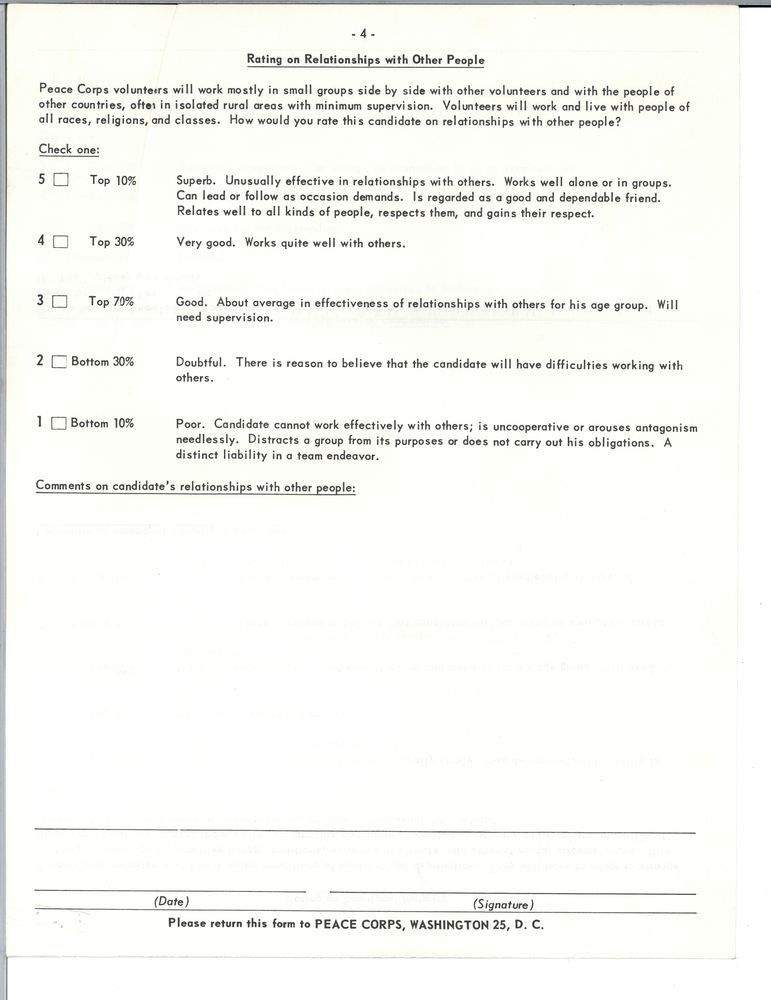Cultural Diplomacy and the Smith-Mundt Act
Making Connections
All documents and text associated with this activity are printed below, followed by a worksheet for student responses.Introduction
In 1948 Congress passed the Smith-Mundt or United States Information and Educational Exchange Act. Designed to "increase mutual understanding" between the United States and other countries, the legislation promoted programs that developed personal contacts between Americans and others, such as the Peace Corps. In addition, the goals of programs such as the radio program Voice of America were to help non-Americans develop a familiarity with, and affinity for, Americans and American culture. Through books, radio, and television, citizens of other nations could develop an understanding of American values, freedoms, and experiences.Name:
Class:
Class:
Worksheet
Cultural Diplomacy and the Smith-Mundt Act
Making Connections
Examine the documents and text included in this activity. Fill in any blanks in the sequence with your thoughts and write your conclusion response in the space provided.After World War II, the United States engaged in nation-building activities in the hope that former Axis countries such as Germany and Italy would develop as democracies. Look at the next photograph. In the blank box that follows, answer: In what way could activities like traveling libraries (or bookmobiles) aid in that effort?
U.S. Information Service (U.S. Information Agency) Bookmobile in Mannheim, Germany
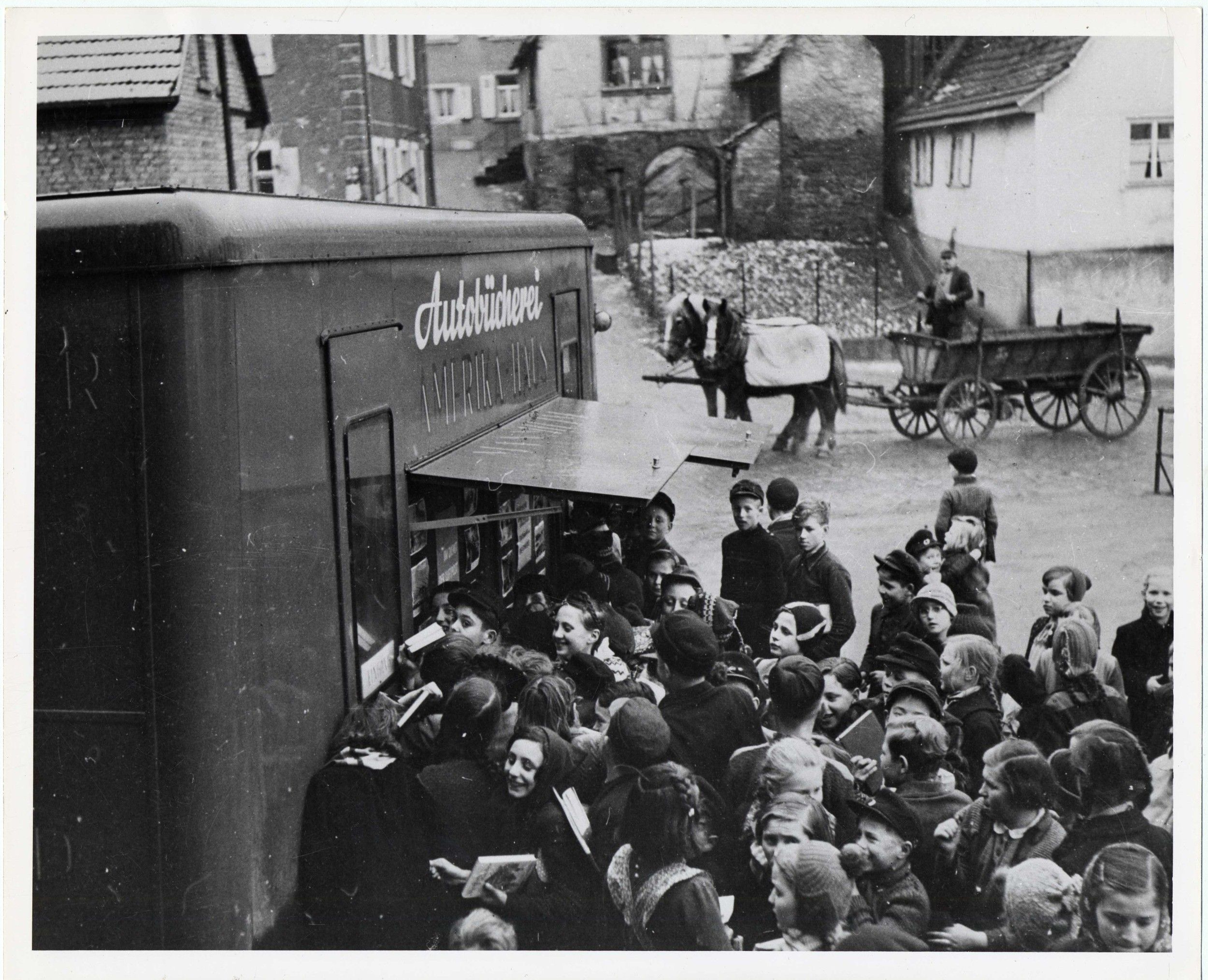
Enter your response
President Ronald Reagan issued a statement in 1982 to provide direction for US communication to foreign countries. Read his speech and the document about US military intervention in Cuba (from the period after the Cuban Missile Crisis) that follows. Then answer these questions in the blank box:
How did Voice of America, Radio-Free Europe/Radio Liberty, and Radio Marti serve the national interest of the United States? Further, how was Radio Marti a change from prior US policy towards Cuba?
What was the "information revolution" that President Reagan spoke of and how does it relate to his 1982 directive?
How did Voice of America, Radio-Free Europe/Radio Liberty, and Radio Marti serve the national interest of the United States? Further, how was Radio Marti a change from prior US policy towards Cuba?
What was the "information revolution" that President Reagan spoke of and how does it relate to his 1982 directive?
National Security Decision Directive 45: United States International Broadcasting
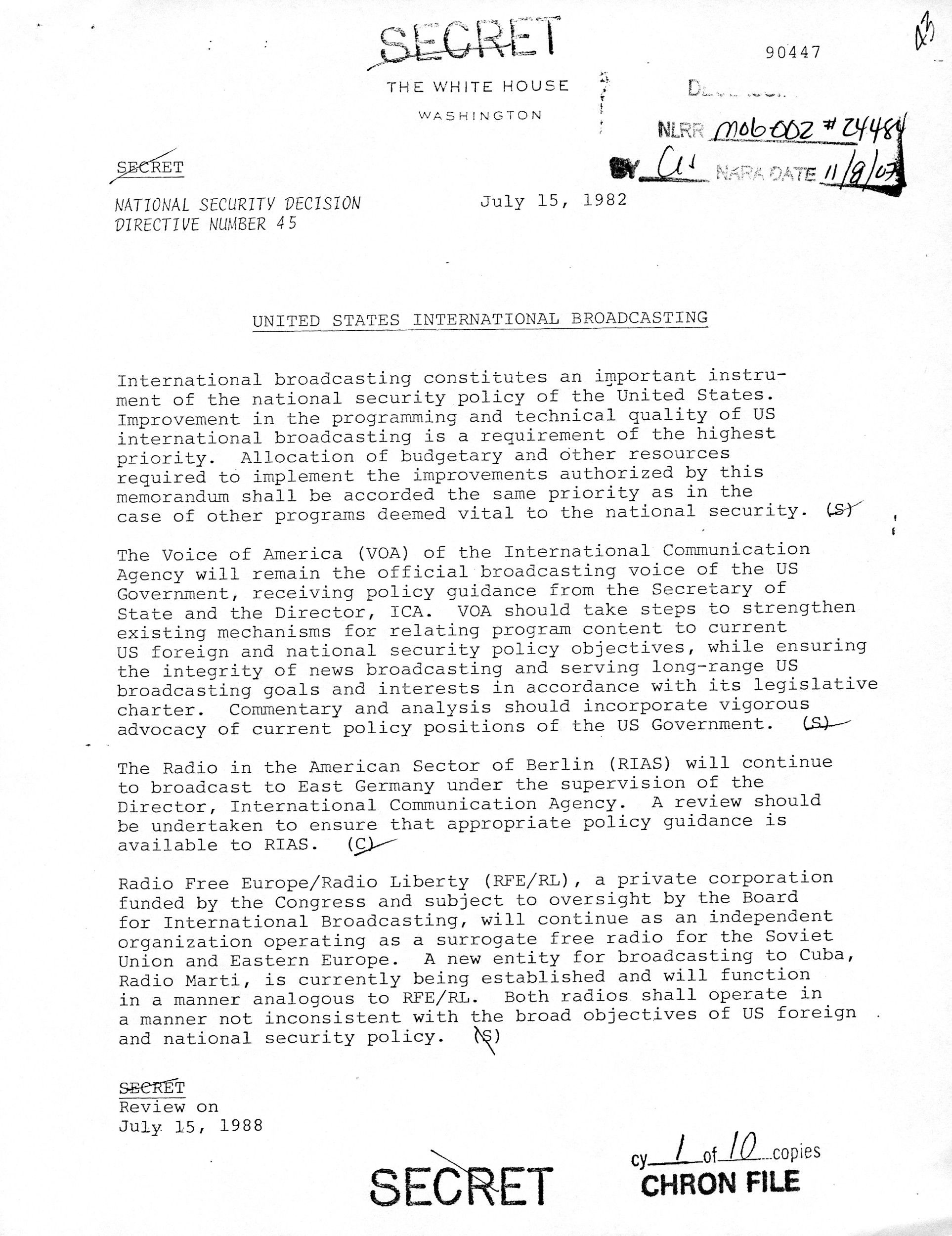
Records Concerning National Aspects of U.S. Military Intervention in Cuba
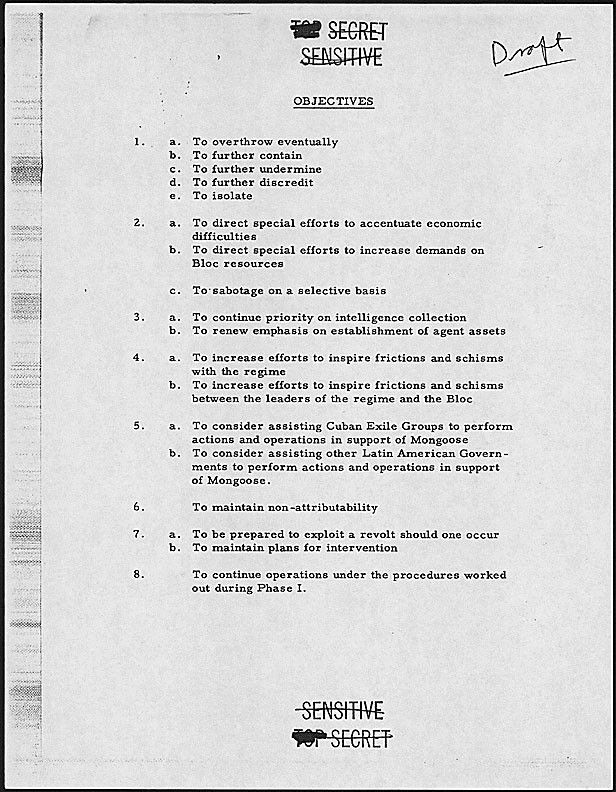
Enter your response
The Peace Corps was created by President John F. Kennedy in 1961. Look at the following legislation, candidate questionnaire, and photograph. Then answer: based on these, would you define the Peace Corps as an example of cultural diplomacy? How so?
Act of September 22, 1961 (Peace Corps Act), Public Law 87-293, 75 STAT 612, which established a Peace Corps to help the people of interested countries and areas in meeting their needs for skilled man
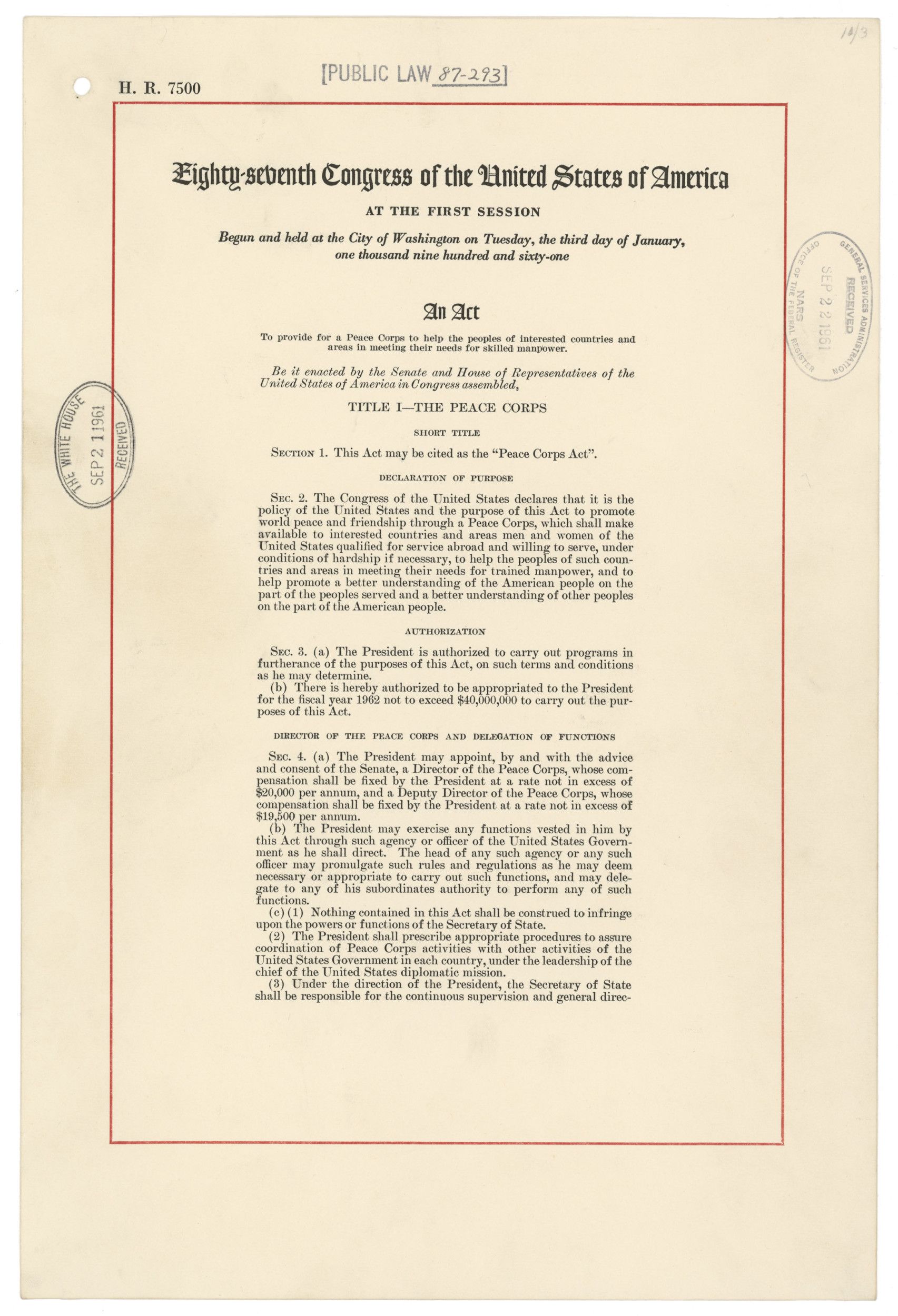
Peace Corps Volunteer Questionnaire
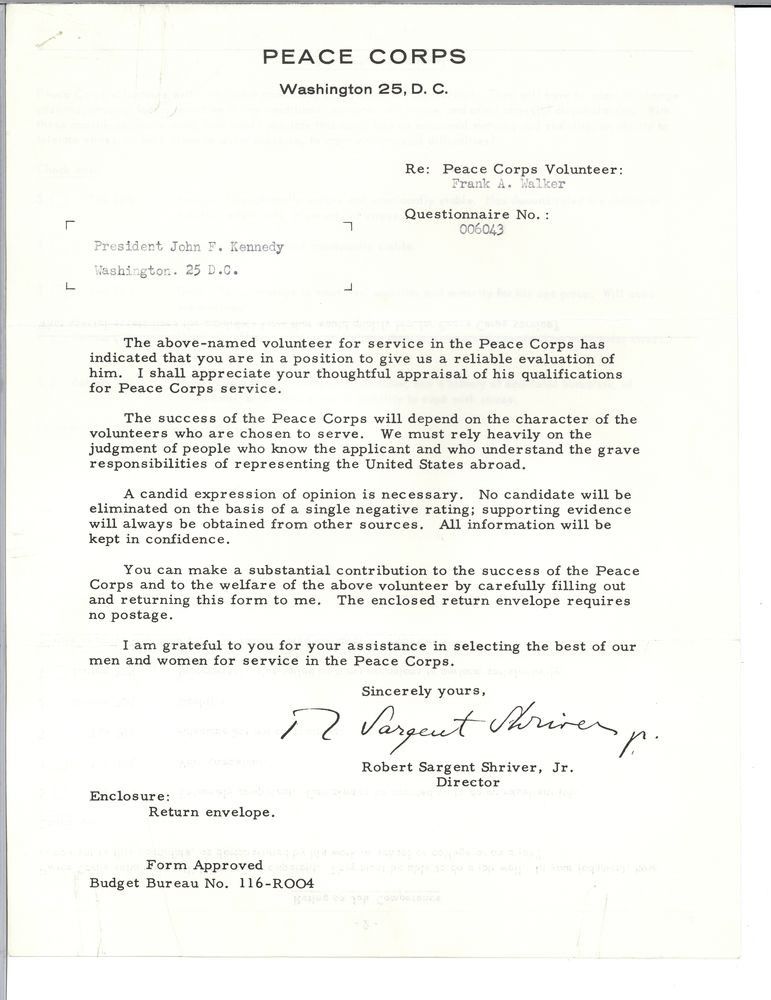
Enter your response
1
Activity Element
U.S. Information Service (U.S. Information Agency) Bookmobile in Mannheim, Germany
Page 1

2
Activity Element
National Security Decision Directive 45: United States International Broadcasting
Page 1

3
Activity Element
Records Concerning National Aspects of U.S. Military Intervention in Cuba
Page 3

4
Activity Element
Act of September 22, 1961 (Peace Corps Act), Public Law 87-293, 75 STAT 612, which established a Peace Corps to help the people of interested countries and areas in meeting their needs for skilled man
Page 1

5
Activity Element
Peace Corps Volunteer Questionnaire
Page 1

Conclusion
Cultural Diplomacy and the Smith-Mundt Act
Making Connections
In recent years, American film, television, and the Internet has spread American culture far beyond our borders. Using the examples from this activity, hypothesize what projects and programs could be created to improve relations today between the United States and the Middle East and the United States and North Korea.Your Response
Document
U.S.I.S. Bookmobile, Mannheim, Germany
3/1952
After the allied victory in World War II, the United States played a pivotal role in rebuilding Europe both physically and culturally. Programs such as the Marshall Plan were designed to rebuild Europe’s economy, and indirectly the US economy, with stimulus aid and necessary provisions such as food, fuel, and other staples.
Part of this humanitarian effort included developing cultural programs that served to boost morale in war-torn populations, as well as to create a positive international perception of America. The United States Information and Educational Exchange Act – popularly known as the Smith-Mundt Act – was passed in 1948 to “promote a better understanding of the United States in other countries, and to increase mutual understanding.” International efforts included sending out bookmobiles with materials and programs for cultural enrichment.
The original caption for this photograph reads: At Gross Sachson (population 1,900), 12% of the people are registered at the bookmobile. Eager children use their elbows to be first inside the car.
Part of this humanitarian effort included developing cultural programs that served to boost morale in war-torn populations, as well as to create a positive international perception of America. The United States Information and Educational Exchange Act – popularly known as the Smith-Mundt Act – was passed in 1948 to “promote a better understanding of the United States in other countries, and to increase mutual understanding.” International efforts included sending out bookmobiles with materials and programs for cultural enrichment.
The original caption for this photograph reads: At Gross Sachson (population 1,900), 12% of the people are registered at the bookmobile. Eager children use their elbows to be first inside the car.
This primary source comes from the Records of the U.S. Information Agency.
National Archives Identifier: 23932394
Full Citation: Photograph 306-CS-4A-2; U.S.I.S. Bookmobile, Mannheim, Germany; 3/1952; Photographs of Information Center Service Activities in Foreign Countries, 1948 - 1954; Records of the U.S. Information Agency, ; National Archives at College Park, College Park, MD. [Online Version, https://docsteach.org/documents/document/bookmobile-mannheim-germany, April 18, 2024]U.S.I.S. Bookmobile, Mannheim, Germany
Page 1
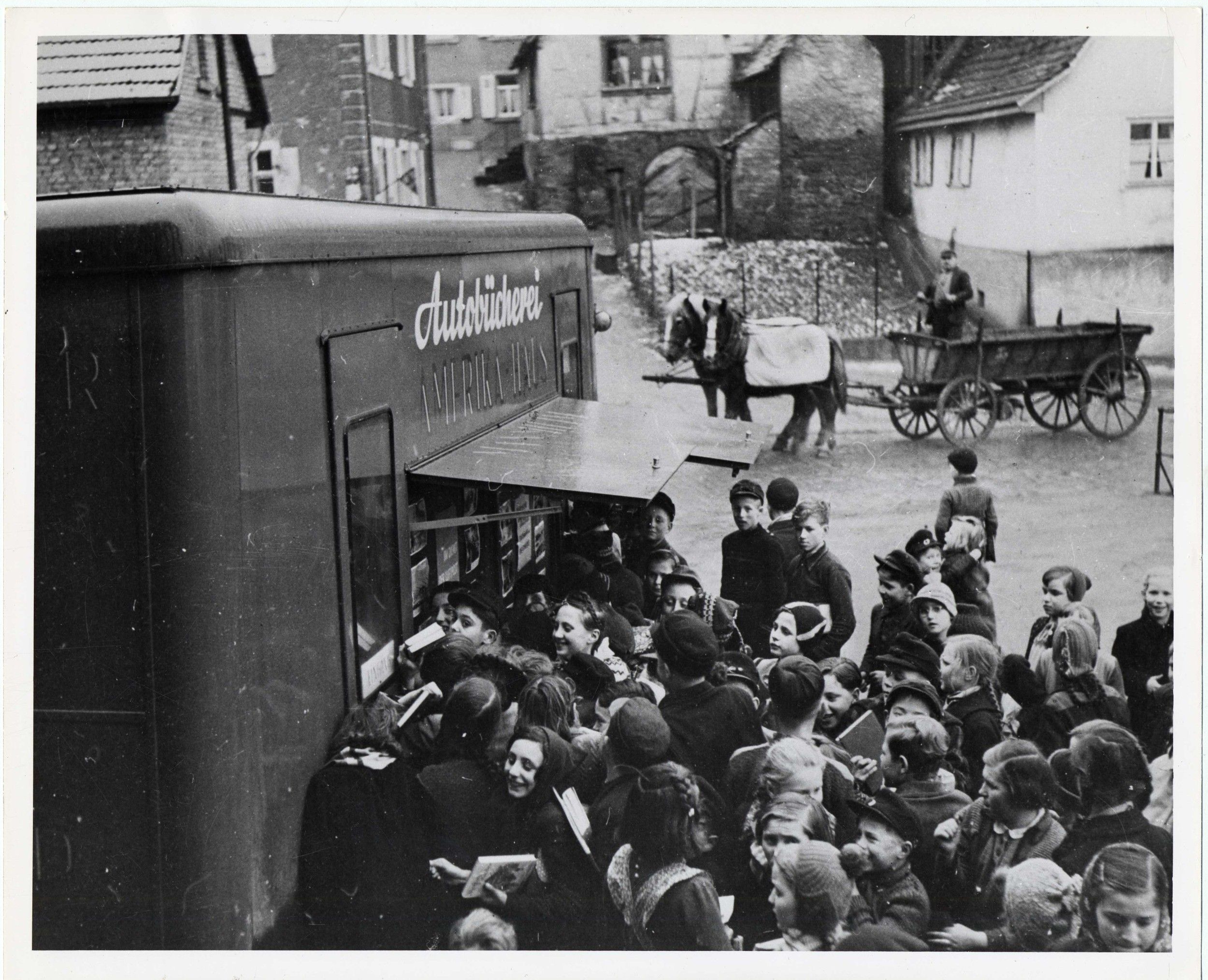
Document
National Security Decision Directive 45: United States International Broadcasting
7/15/1982
This comes from a series of National Security Decision Directives (NSDDs), that were issued by President Ronald Reagan and his Assistants to the President for National Security Affairs to set forth official national security policy for the guidance of the defense, intelligence, and foreign policy establishments of the U.S. Government.
This primary source comes from the Collection RR-NSC: Numbered National Security Policy Papers.
National Archives Identifier: 6879647
Full Citation: National Security Decision Directive 45: United States International Broadcasting; 7/15/1982; Collection RR-NSC: Numbered National Security Policy Papers, . [Online Version, https://docsteach.org/documents/document/national-security-decision-directive-45-united-states-international-broadcasting, April 18, 2024]National Security Decision Directive 45: United States International Broadcasting
Page 1
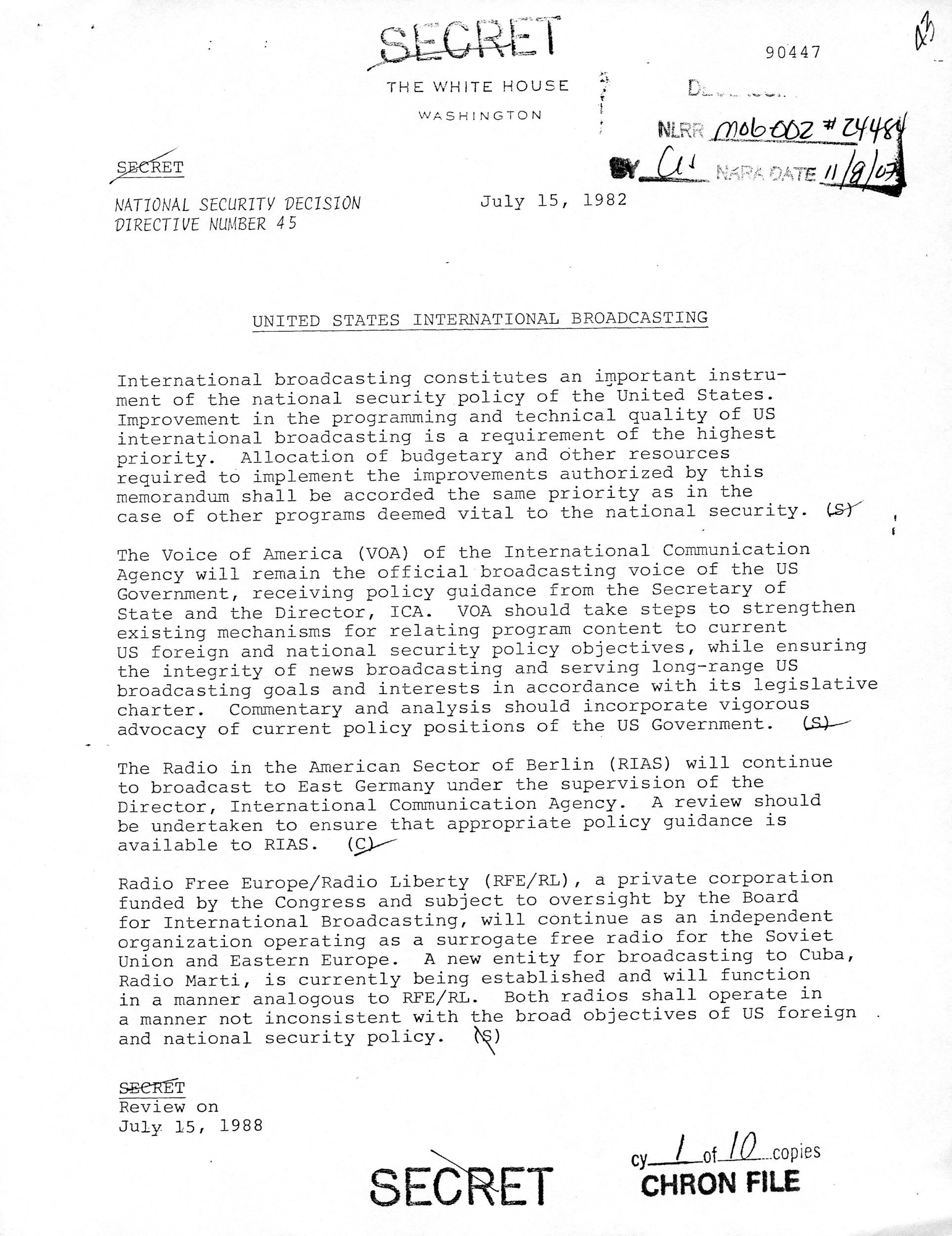
National Security Decision Directive 45: United States International Broadcasting
Page 2
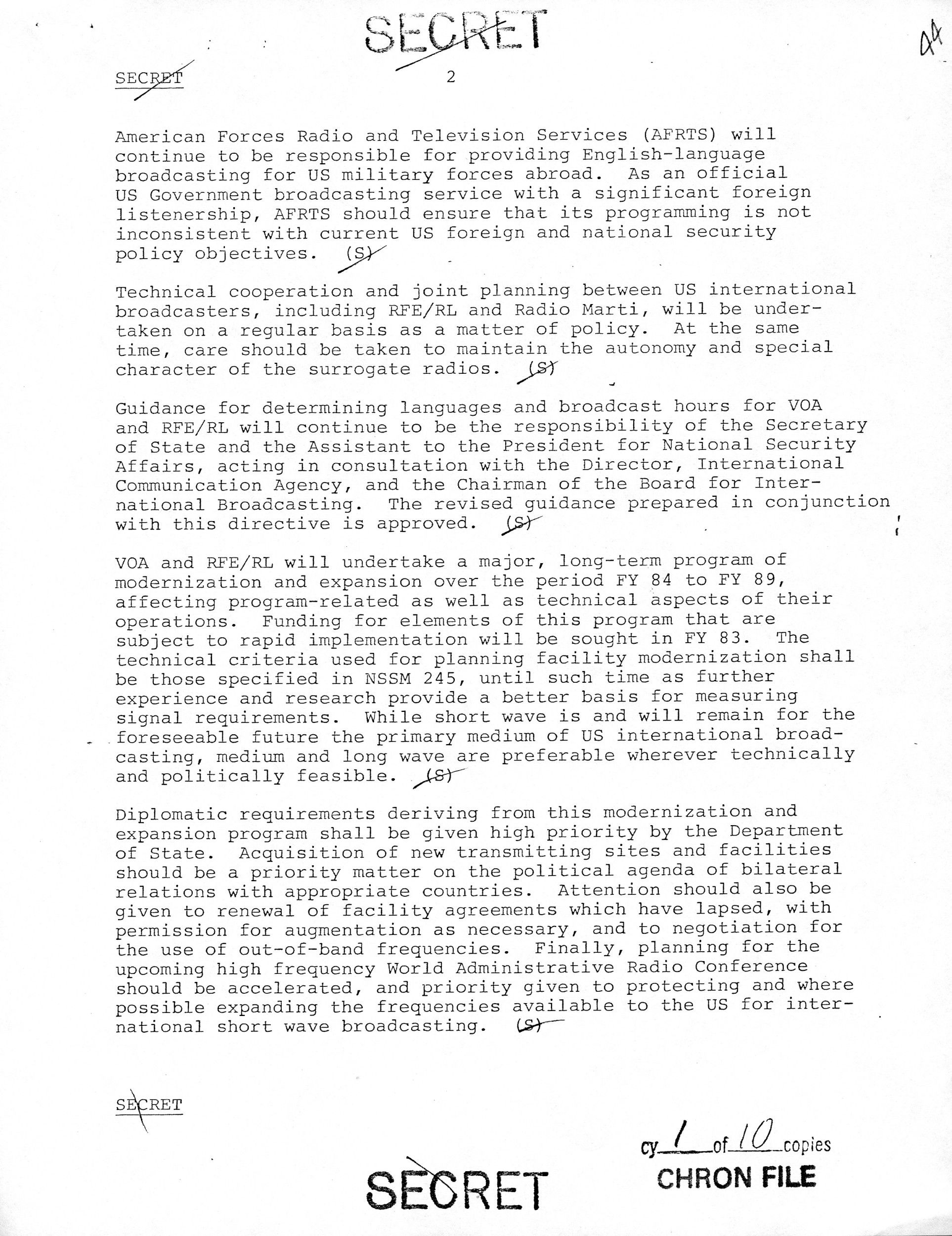
National Security Decision Directive 45: United States International Broadcasting
Page 3
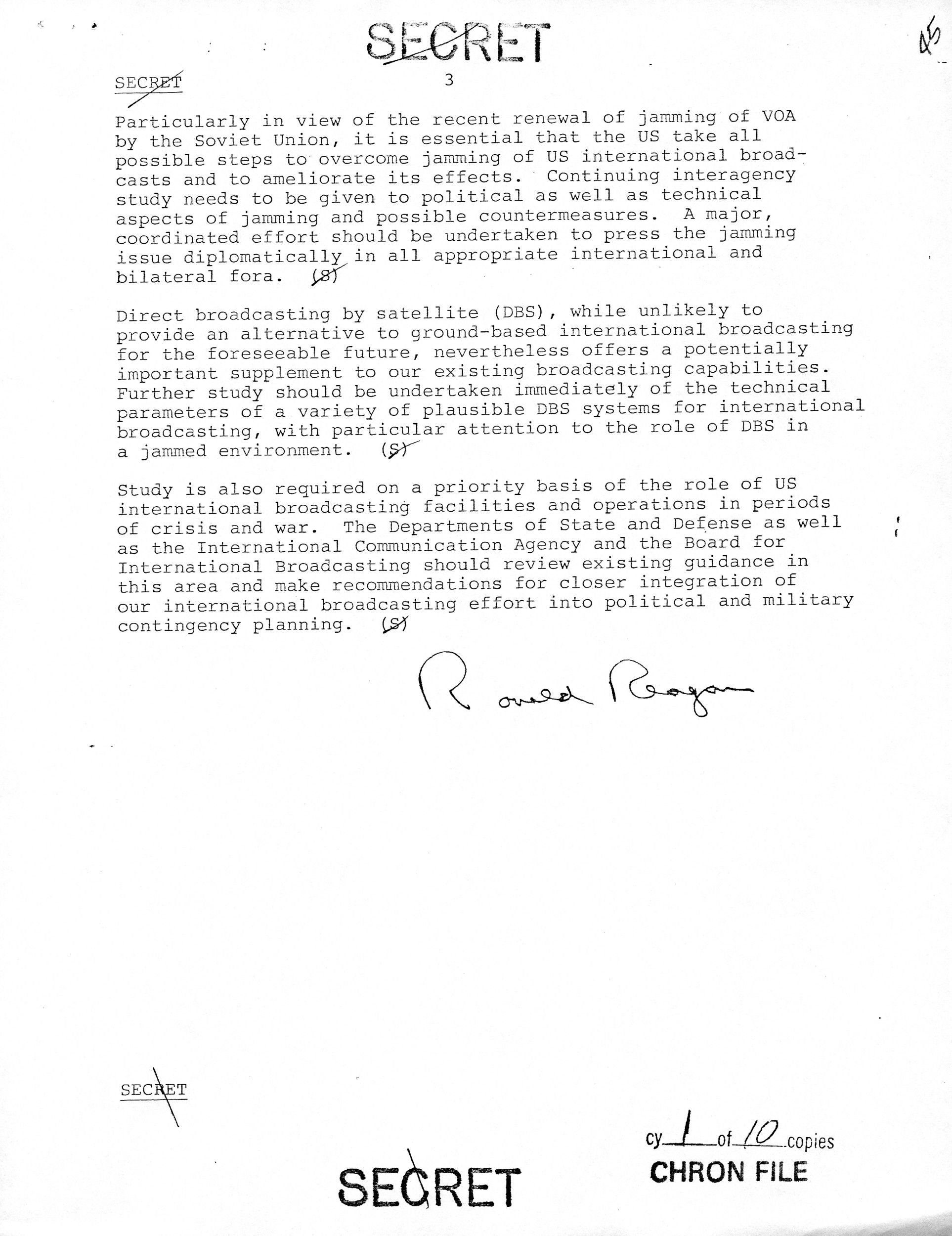
Document
Records Concerning National Aspects of U.S. Military Intervention in Cuba
3/1/1963
Pages 2-7 of the full document are shown here: objectives in Cuba and "proposed actions which might be taken to impede the movement of subversive trainees to and from Cuba." See the entire 133-page document in the National Archives online catalog. It comes from a series of memos, policy papers, reports, agendas, and meeting minutes maintained by the General Counsel in his capacity as the Secretary of the Army's representative on the Intergovernmental Coordinating Committee of Cuban Affairs (ICCCA). These documents outline U.S. operations in support of covert operations against the government of Fidel Castro in the period following the Cuban Missile Crisis and the suspension of Operation Mongoose.
This primary source comes from the Records of the Office of the Secretary of the Army.
National Archives Identifier: 304992
Full Citation: Records Concerning National Aspects of U.S. Military Intervention in Cuba; 3/1/1963; Records of the Office of the Secretary of the Army, . [Online Version, https://docsteach.org/documents/document/records-concerning-national-aspects-of-us-military-intervention-in-cuba, April 18, 2024]Records Concerning National Aspects of U.S. Military Intervention in Cuba
Page 1

Records Concerning National Aspects of U.S. Military Intervention in Cuba
Page 2
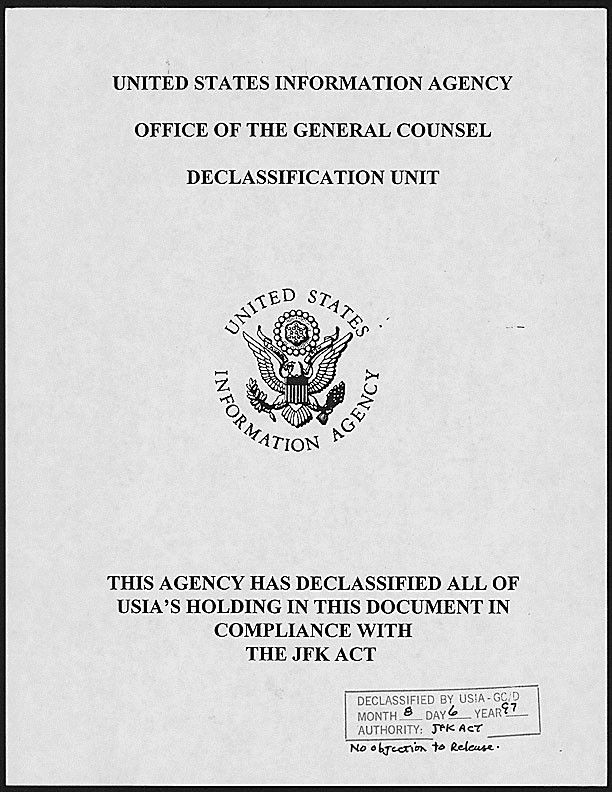
Records Concerning National Aspects of U.S. Military Intervention in Cuba
Page 3
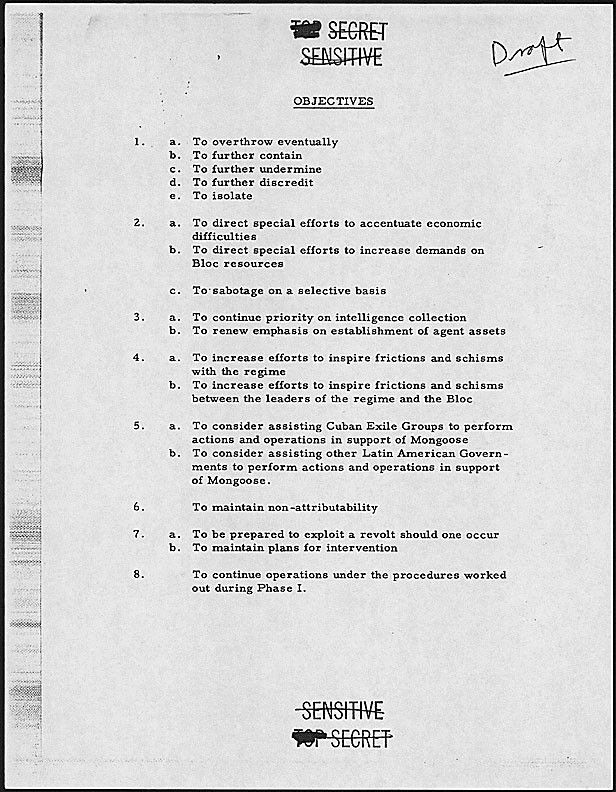
Records Concerning National Aspects of U.S. Military Intervention in Cuba
Page 4
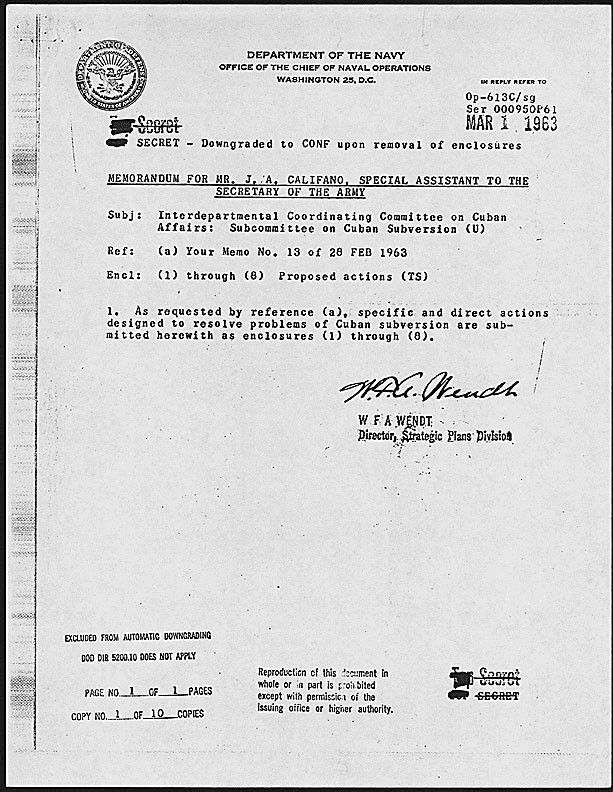
Records Concerning National Aspects of U.S. Military Intervention in Cuba
Page 5
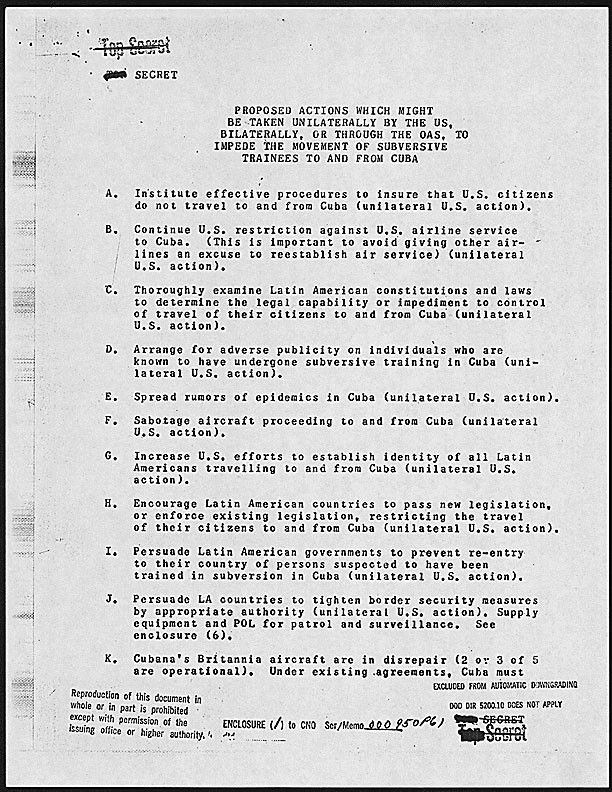
Records Concerning National Aspects of U.S. Military Intervention in Cuba
Page 6
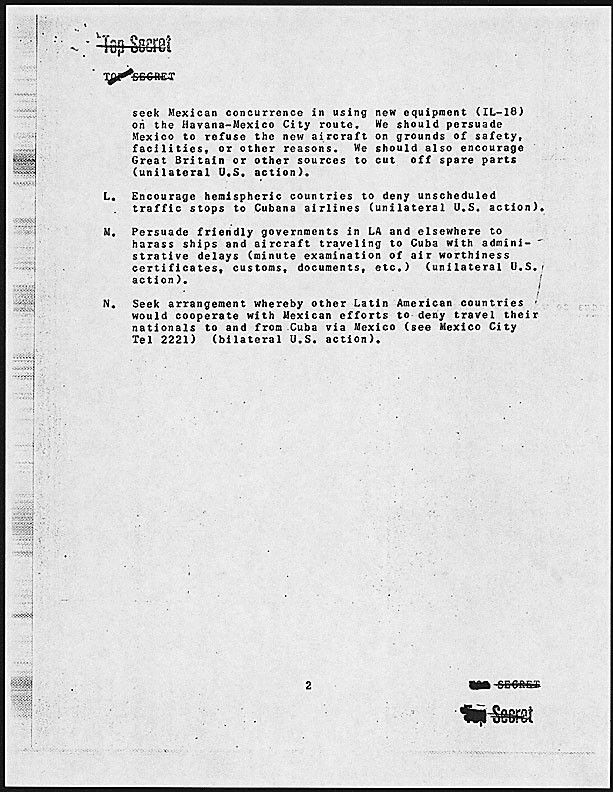
Document
Act of September 22, 1961 (Peace Corps Act), Public Law 87-293, 75 STAT 612, which established a Peace Corps to help the people of interested countries and areas in meeting their needs for skilled man
9/21/1961
Passed in 1961, this Act formalized President John F. Kennedy’s vision of a volunteer organization to provide education and skilled manpower to developing nations. First proposed to students at the University of Michigan during Kennedy’s presidential campaign, the Peace Corps has supplied more than 187,000 volunteers to over 135 different countries.
This primary source comes from the General Records of the United States Government.
National Archives Identifier: 299874
Full Citation: Act of September 22, 1961 (Peace Corps Act), Public Law 87-293, 75 STAT 612, which established a Peace Corps to help the people of interested countries and areas in meeting their needs for skilled man; 9/21/1961; Enrolled Acts and Resolutions of Congress, 1789 - 2013; General Records of the United States Government, ; National Archives Building, Washington, DC. [Online Version, https://docsteach.org/documents/document/peace-corps-act, April 18, 2024]Act of September 22, 1961 (Peace Corps Act), Public Law 87-293, 75 STAT 612, which established a Peace Corps to help the people of interested countries and areas in meeting their needs for skilled man
Page 1
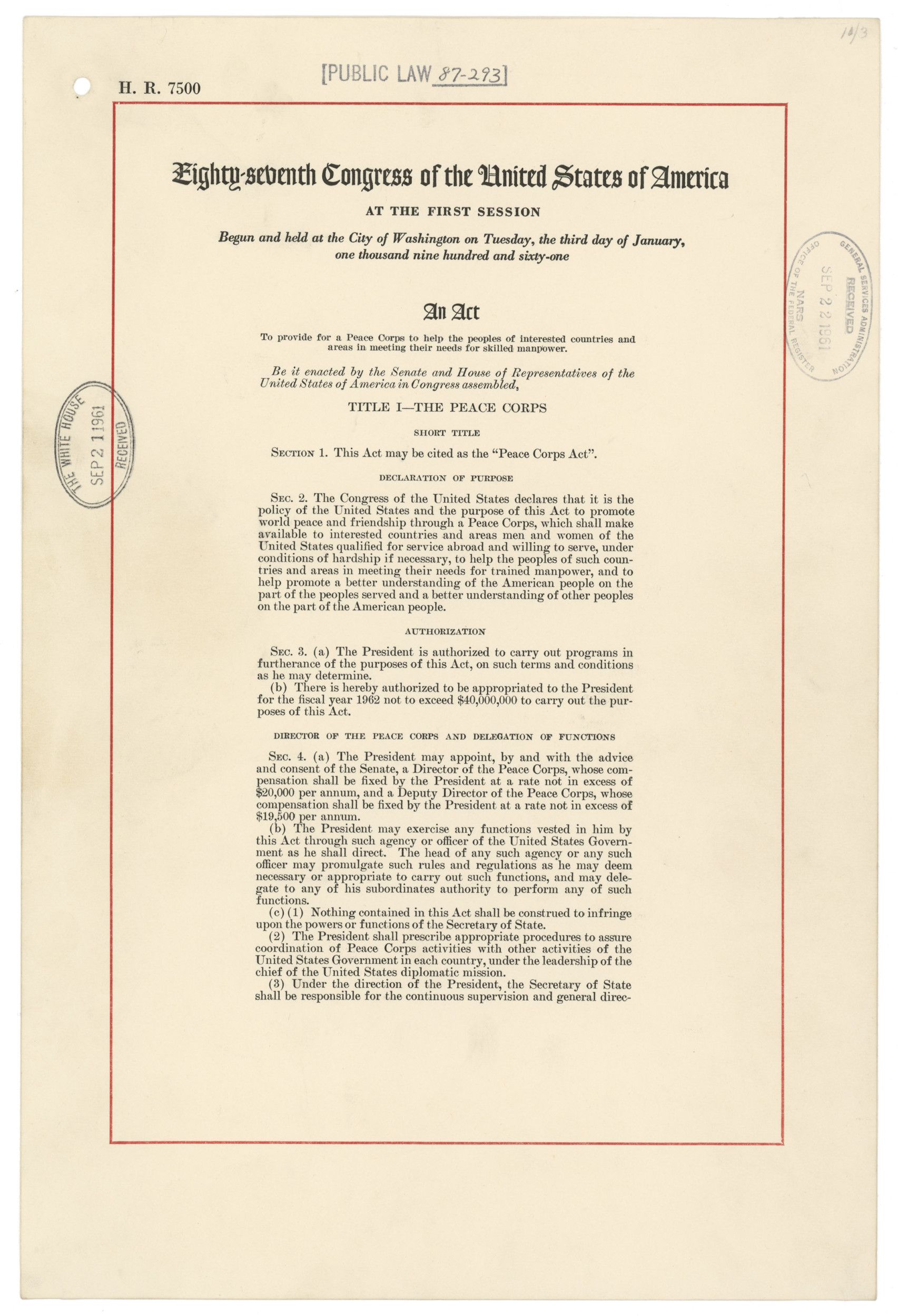
Act of September 22, 1961 (Peace Corps Act), Public Law 87-293, 75 STAT 612, which established a Peace Corps to help the people of interested countries and areas in meeting their needs for skilled man
Page 2
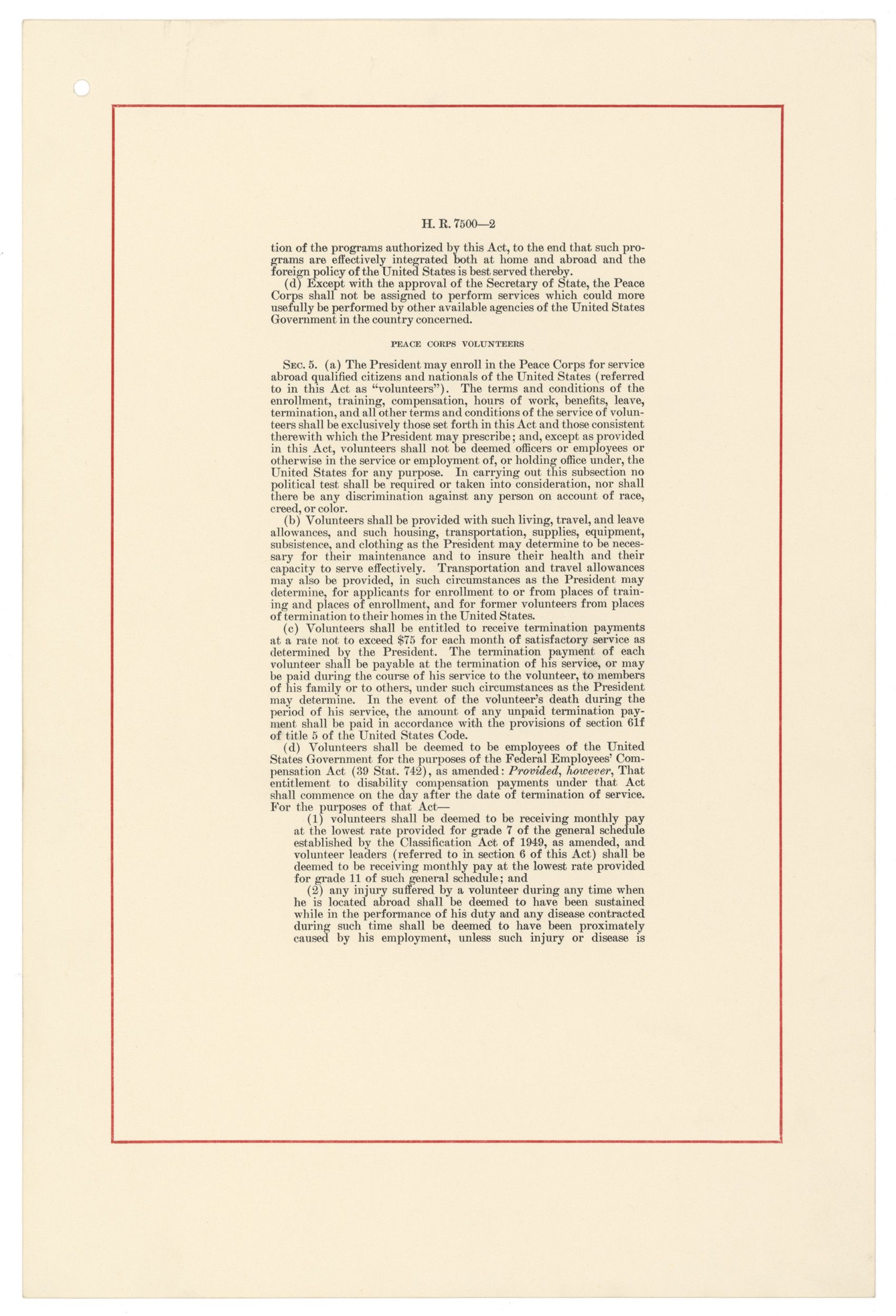
Act of September 22, 1961 (Peace Corps Act), Public Law 87-293, 75 STAT 612, which established a Peace Corps to help the people of interested countries and areas in meeting their needs for skilled man
Page 3
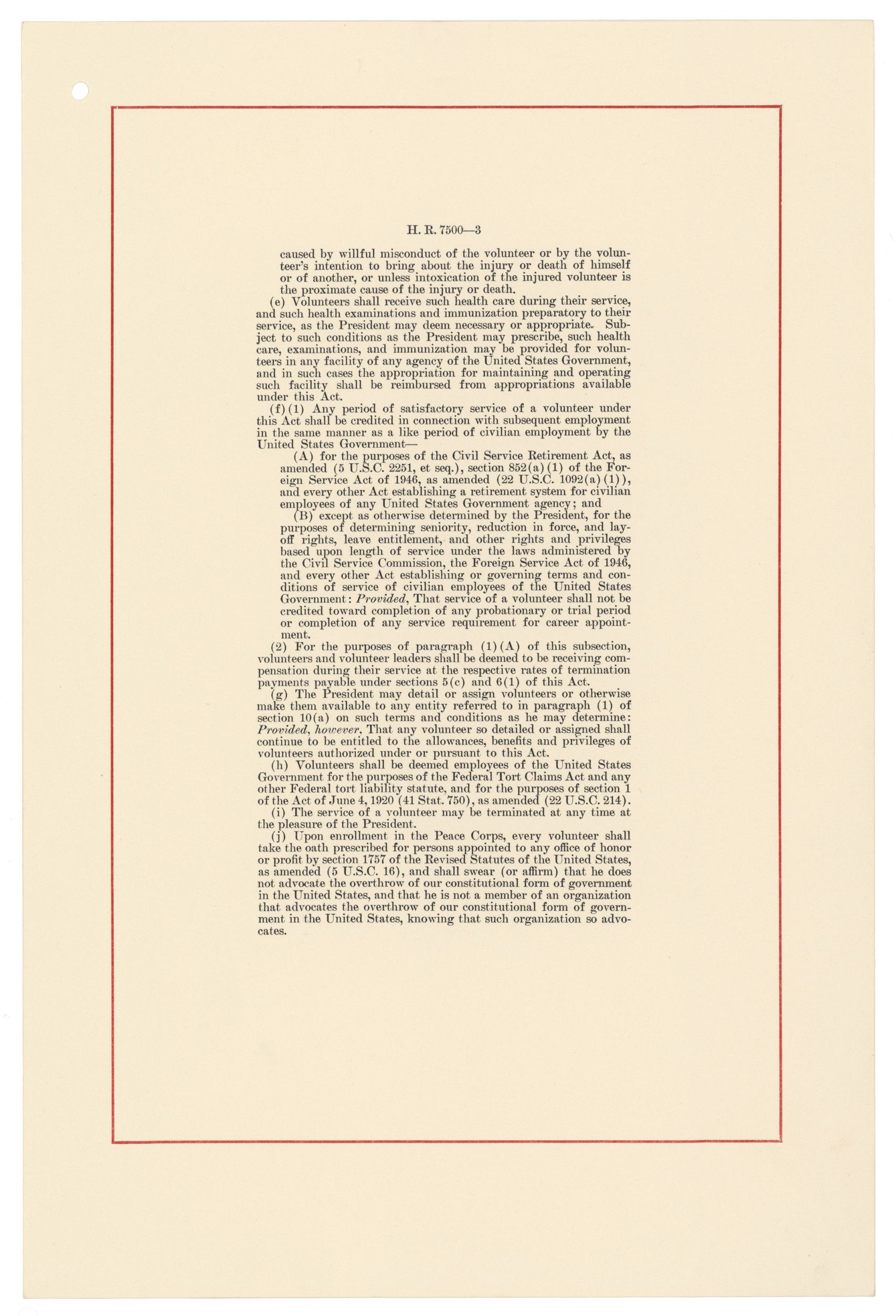
Act of September 22, 1961 (Peace Corps Act), Public Law 87-293, 75 STAT 612, which established a Peace Corps to help the people of interested countries and areas in meeting their needs for skilled man
Page 4
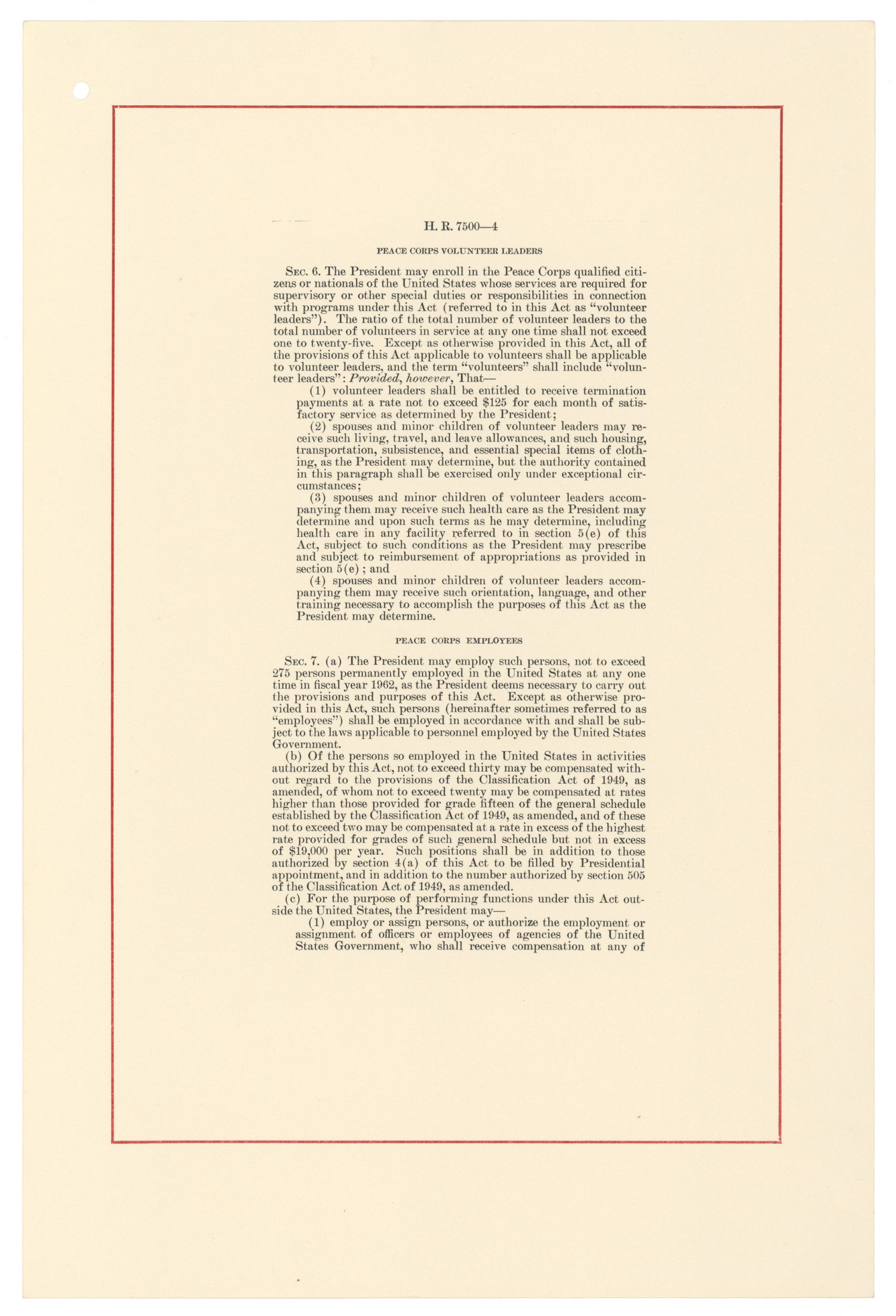
Act of September 22, 1961 (Peace Corps Act), Public Law 87-293, 75 STAT 612, which established a Peace Corps to help the people of interested countries and areas in meeting their needs for skilled man
Page 5
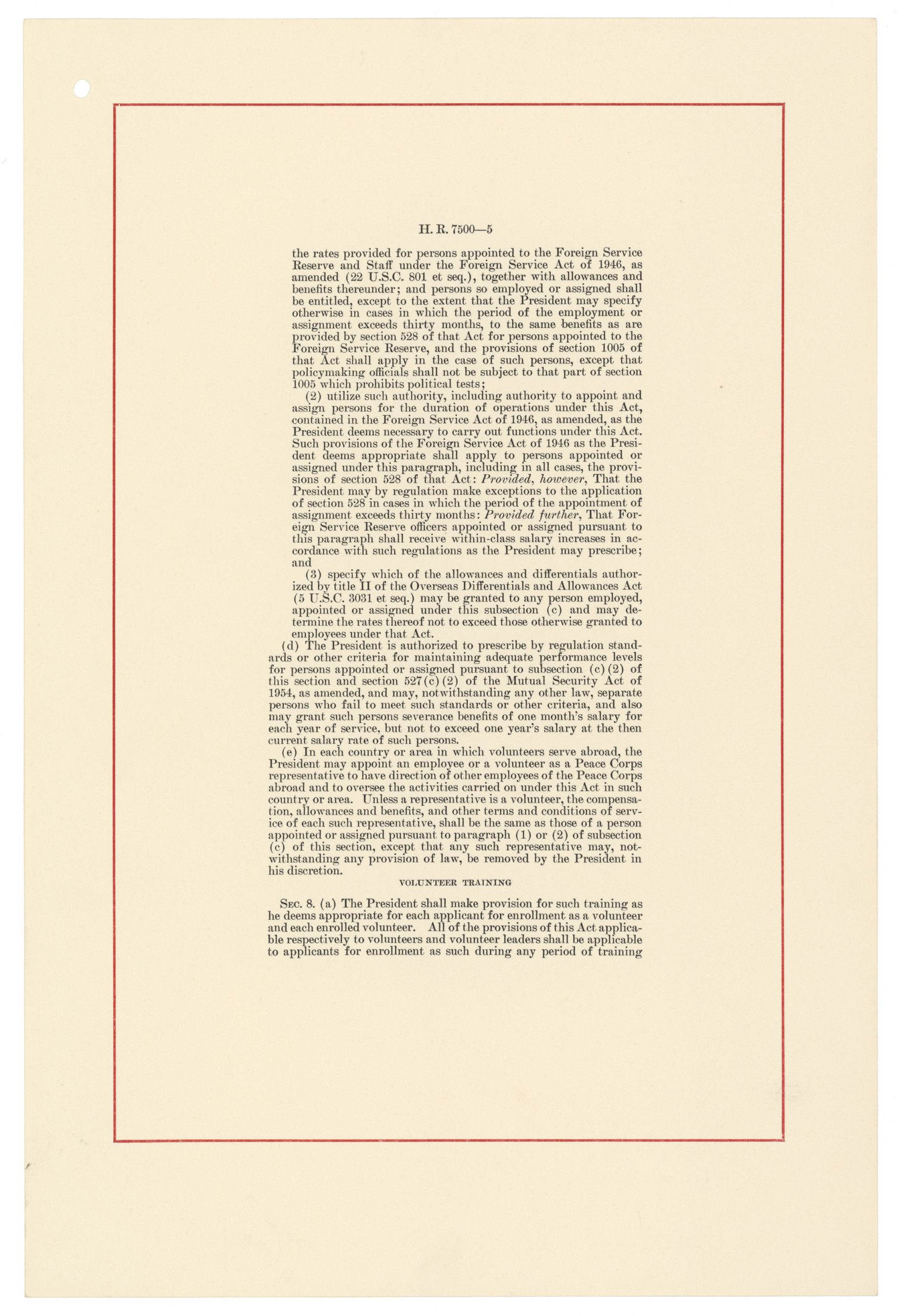
Act of September 22, 1961 (Peace Corps Act), Public Law 87-293, 75 STAT 612, which established a Peace Corps to help the people of interested countries and areas in meeting their needs for skilled man
Page 6
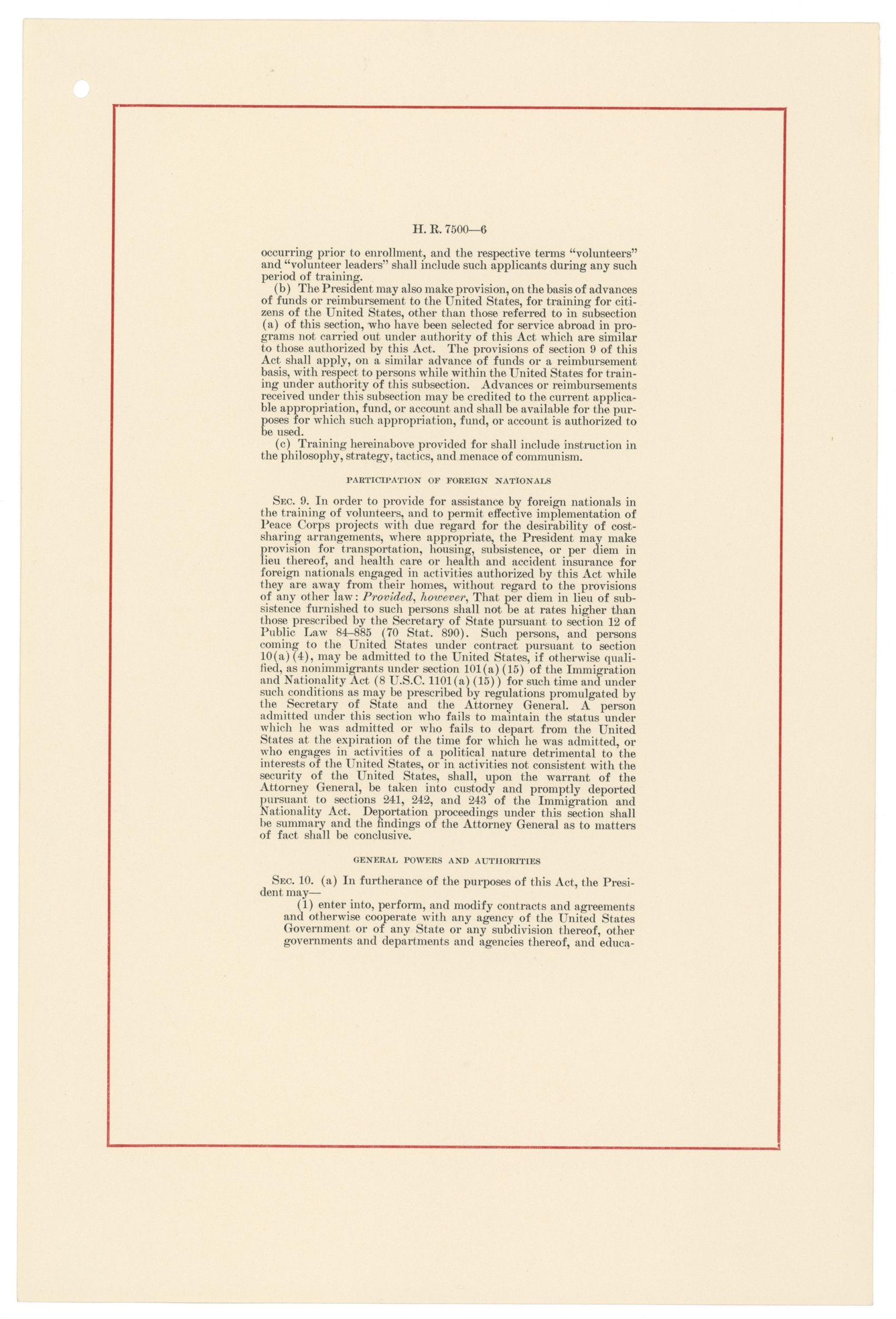
Act of September 22, 1961 (Peace Corps Act), Public Law 87-293, 75 STAT 612, which established a Peace Corps to help the people of interested countries and areas in meeting their needs for skilled man
Page 7
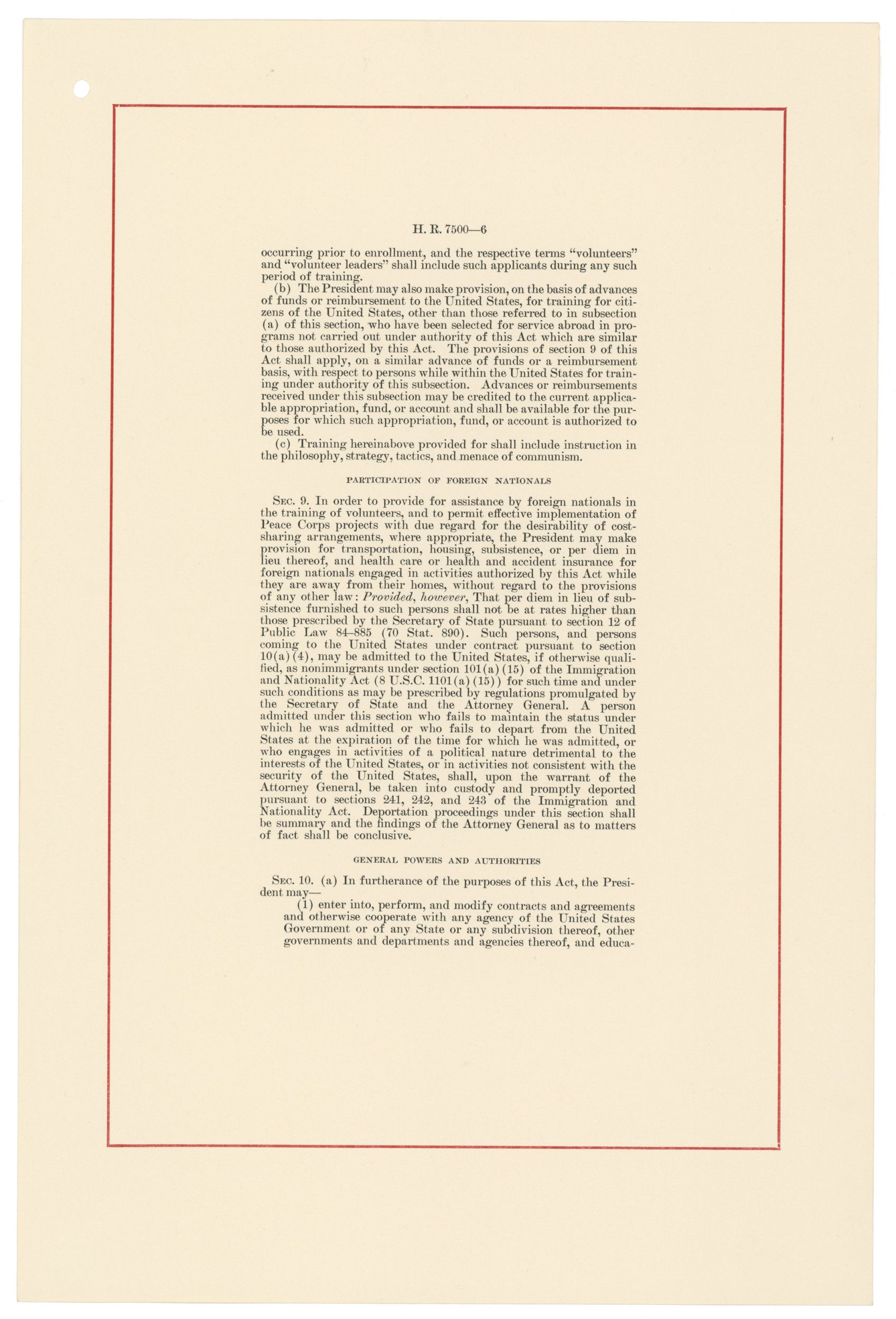
Act of September 22, 1961 (Peace Corps Act), Public Law 87-293, 75 STAT 612, which established a Peace Corps to help the people of interested countries and areas in meeting their needs for skilled man
Page 8
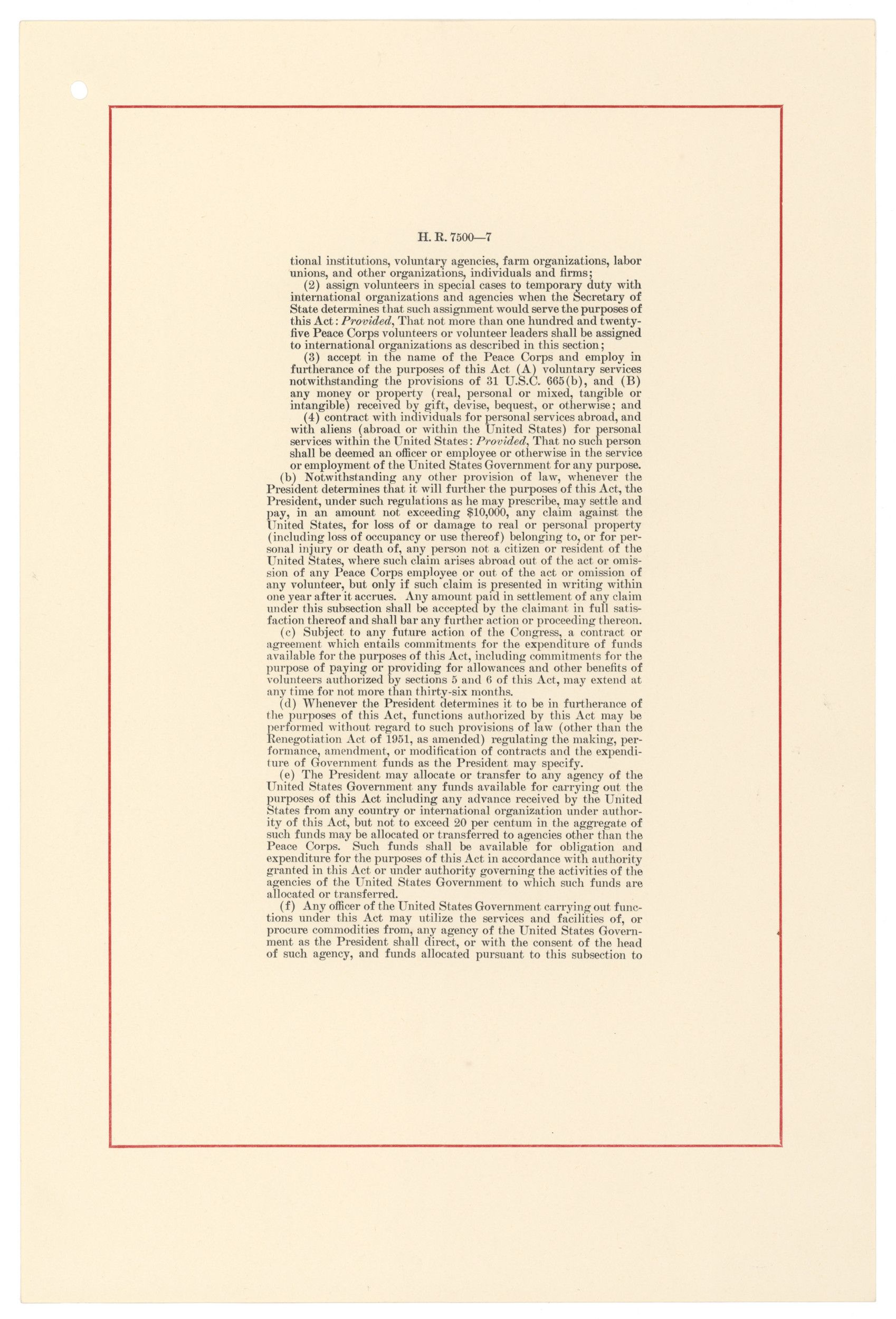
Act of September 22, 1961 (Peace Corps Act), Public Law 87-293, 75 STAT 612, which established a Peace Corps to help the people of interested countries and areas in meeting their needs for skilled man
Page 9
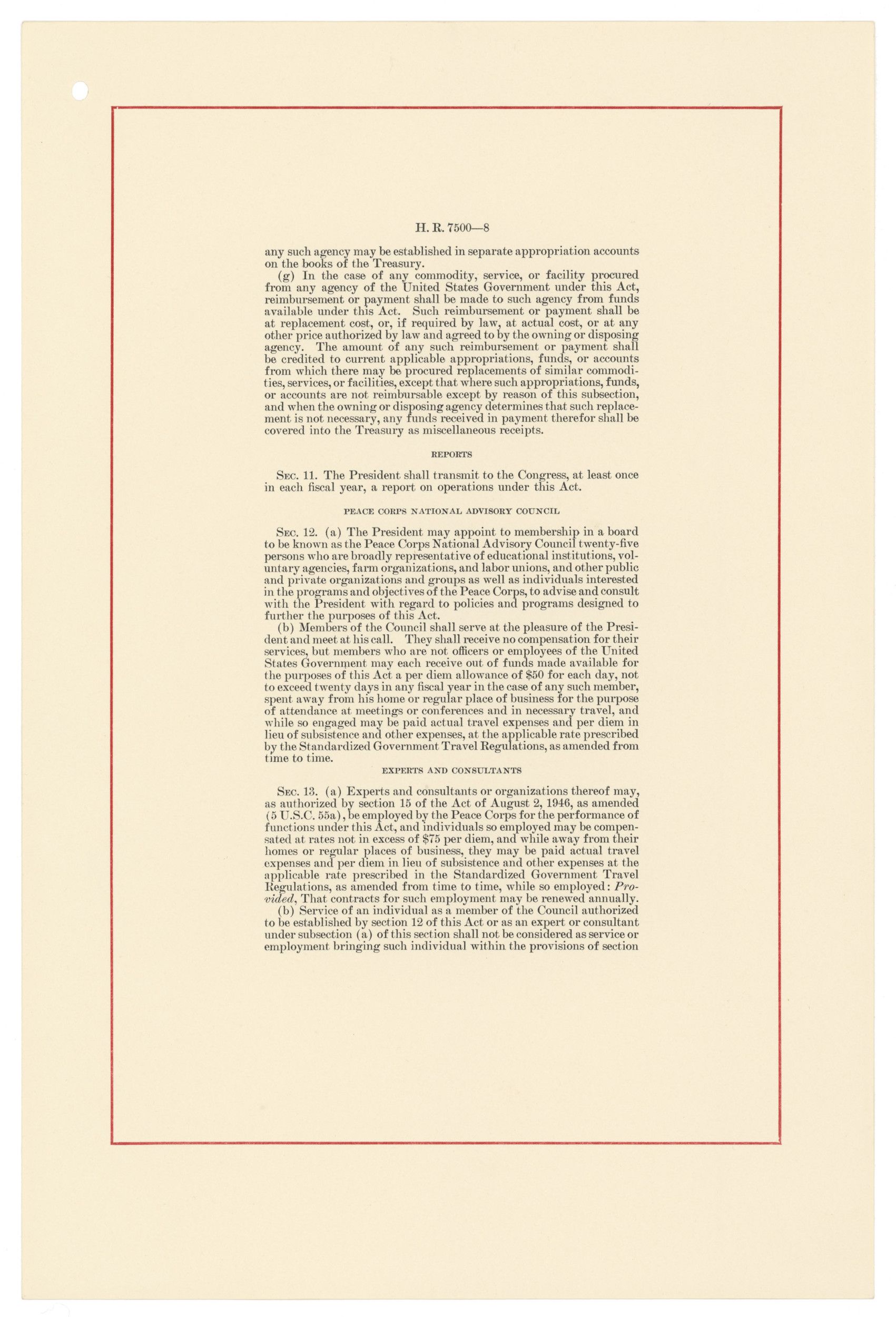
Act of September 22, 1961 (Peace Corps Act), Public Law 87-293, 75 STAT 612, which established a Peace Corps to help the people of interested countries and areas in meeting their needs for skilled man
Page 10
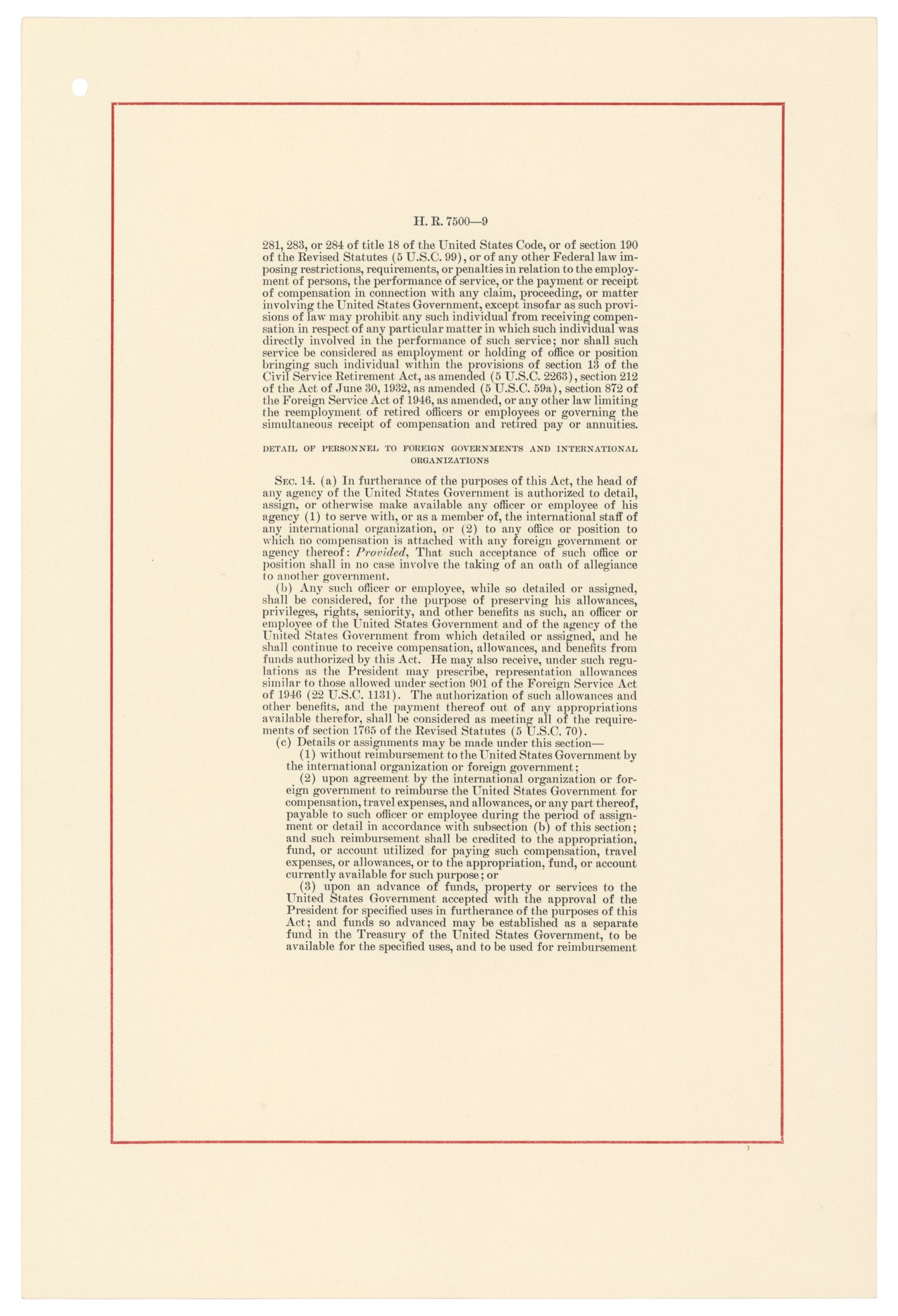
Act of September 22, 1961 (Peace Corps Act), Public Law 87-293, 75 STAT 612, which established a Peace Corps to help the people of interested countries and areas in meeting their needs for skilled man
Page 11
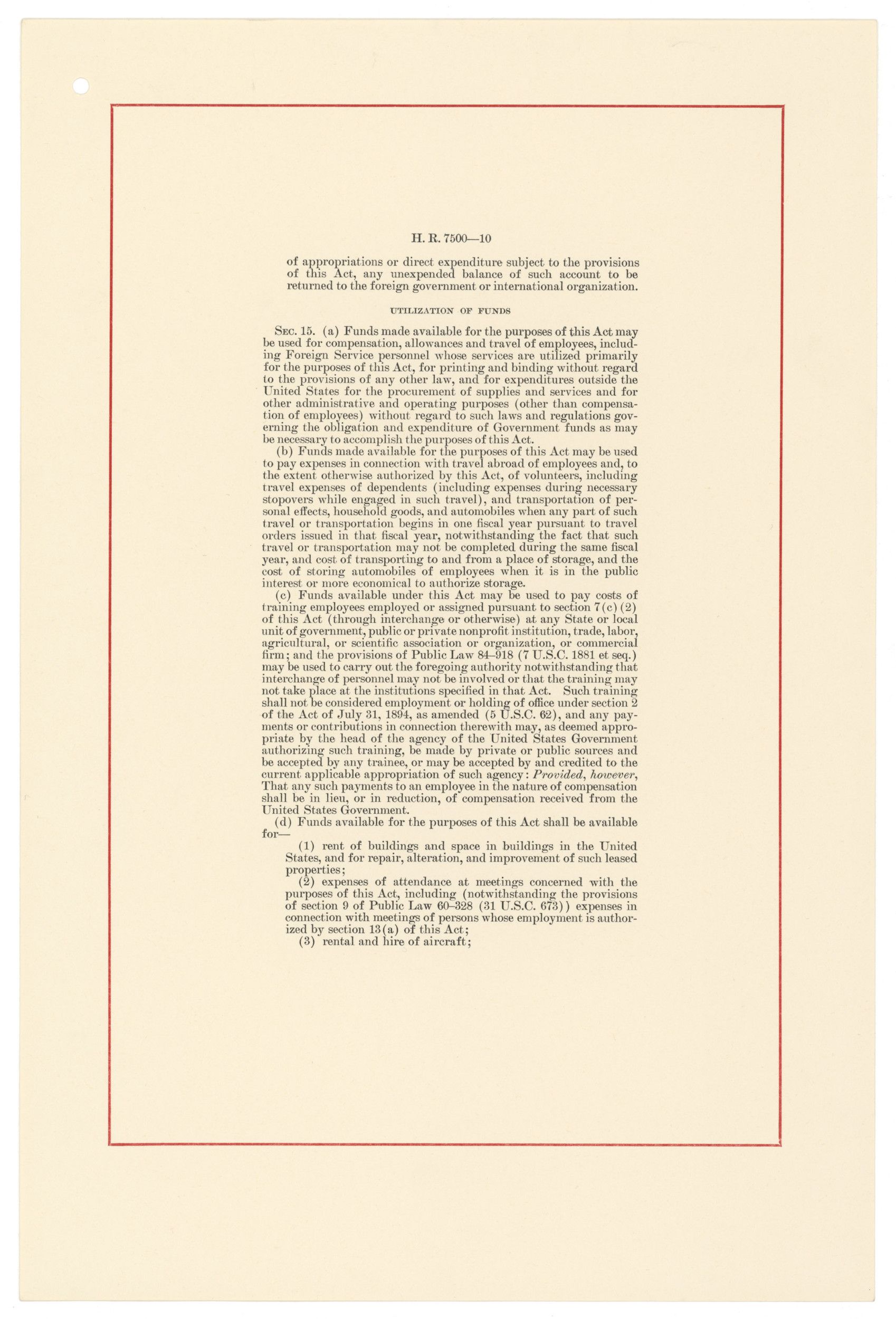
Act of September 22, 1961 (Peace Corps Act), Public Law 87-293, 75 STAT 612, which established a Peace Corps to help the people of interested countries and areas in meeting their needs for skilled man
Page 12
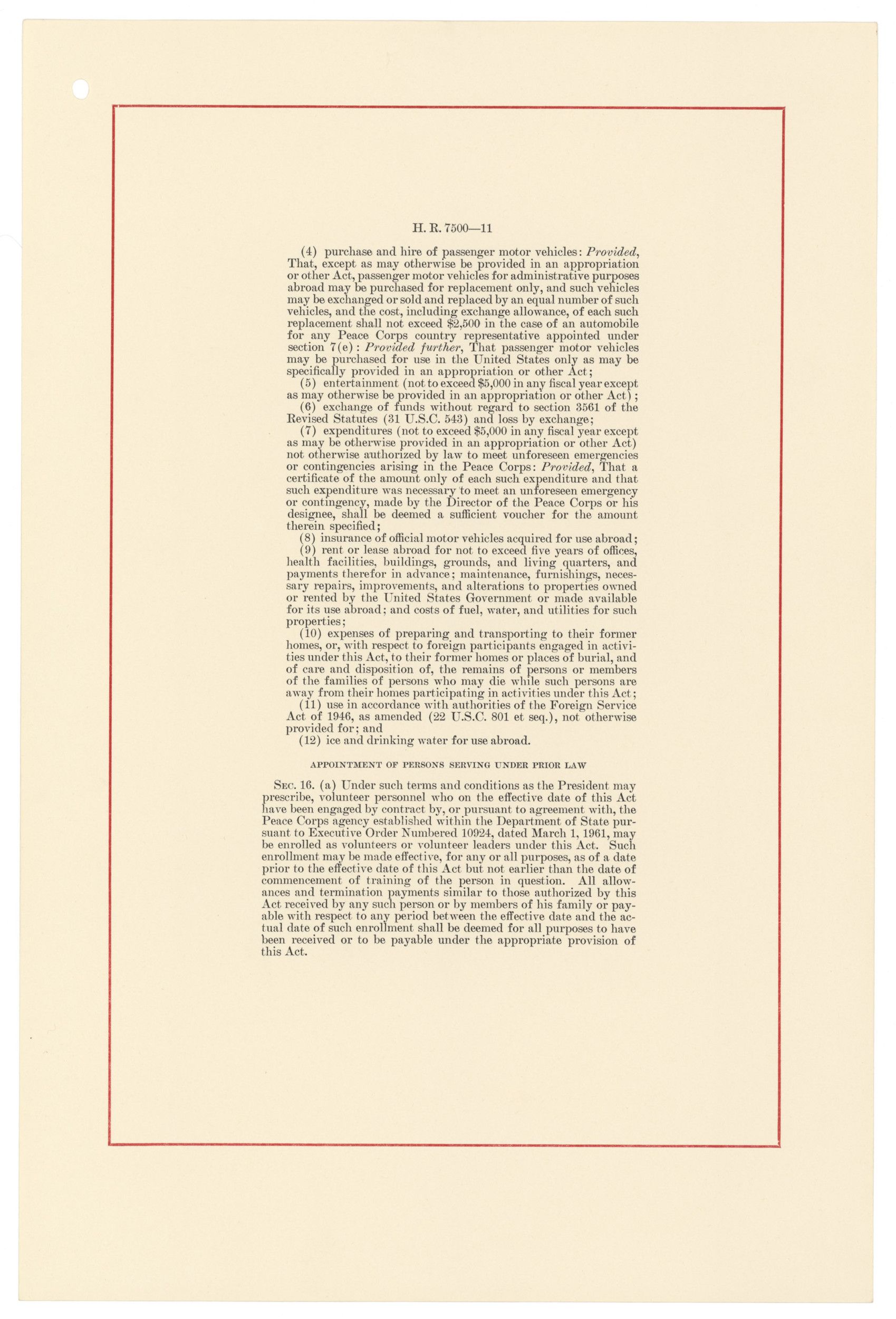
Act of September 22, 1961 (Peace Corps Act), Public Law 87-293, 75 STAT 612, which established a Peace Corps to help the people of interested countries and areas in meeting their needs for skilled man
Page 13
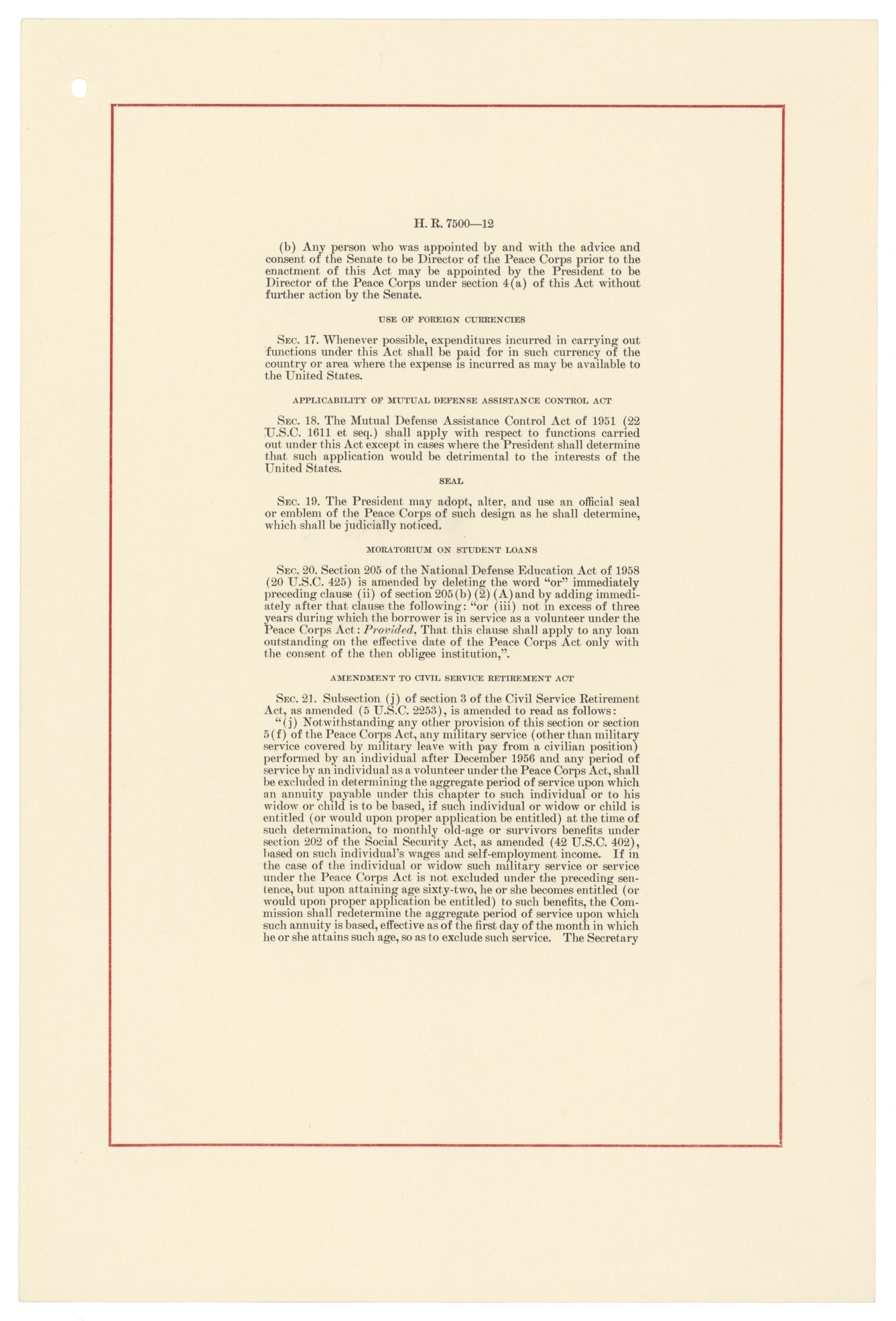
Act of September 22, 1961 (Peace Corps Act), Public Law 87-293, 75 STAT 612, which established a Peace Corps to help the people of interested countries and areas in meeting their needs for skilled man
Page 14
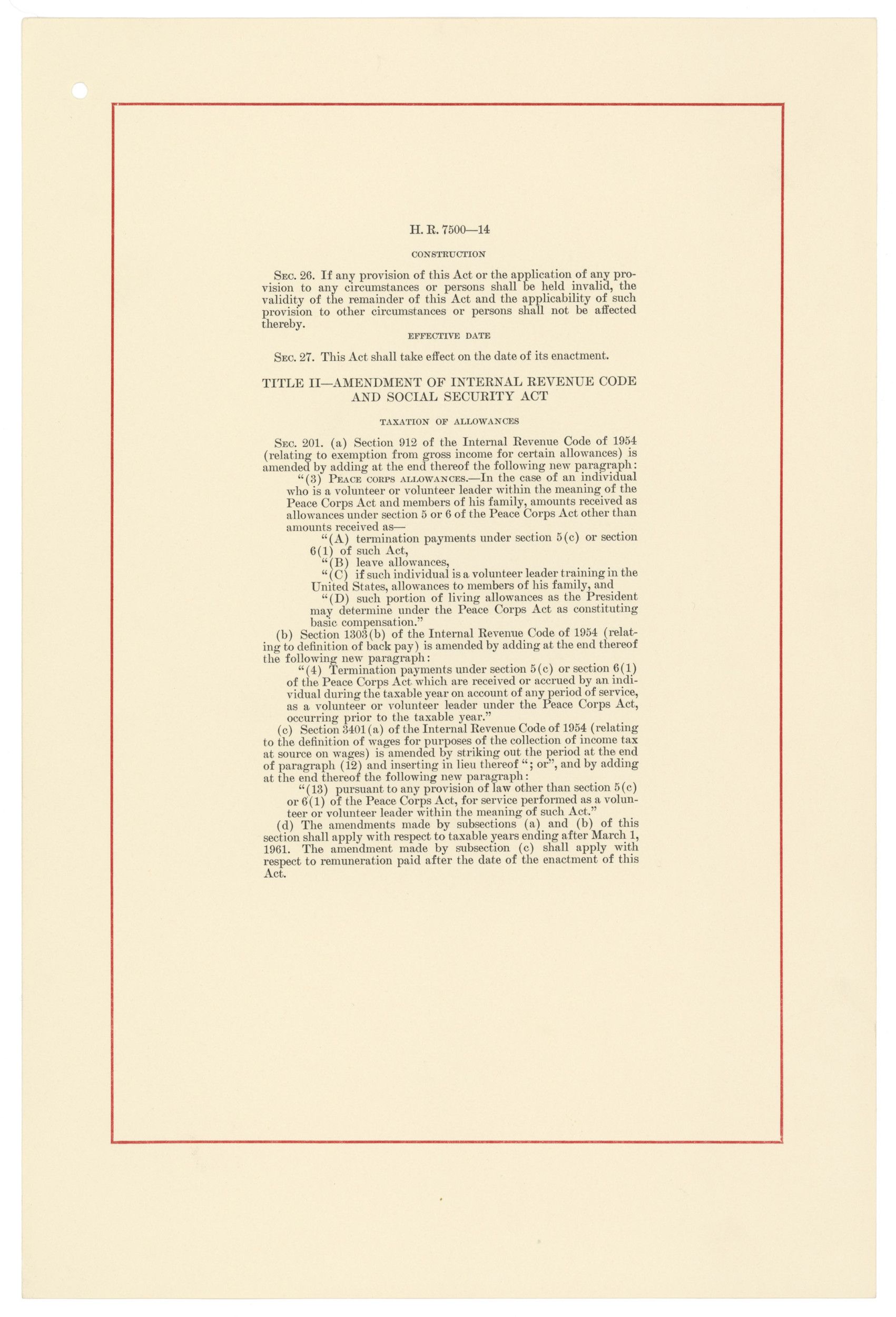
Act of September 22, 1961 (Peace Corps Act), Public Law 87-293, 75 STAT 612, which established a Peace Corps to help the people of interested countries and areas in meeting their needs for skilled man
Page 15
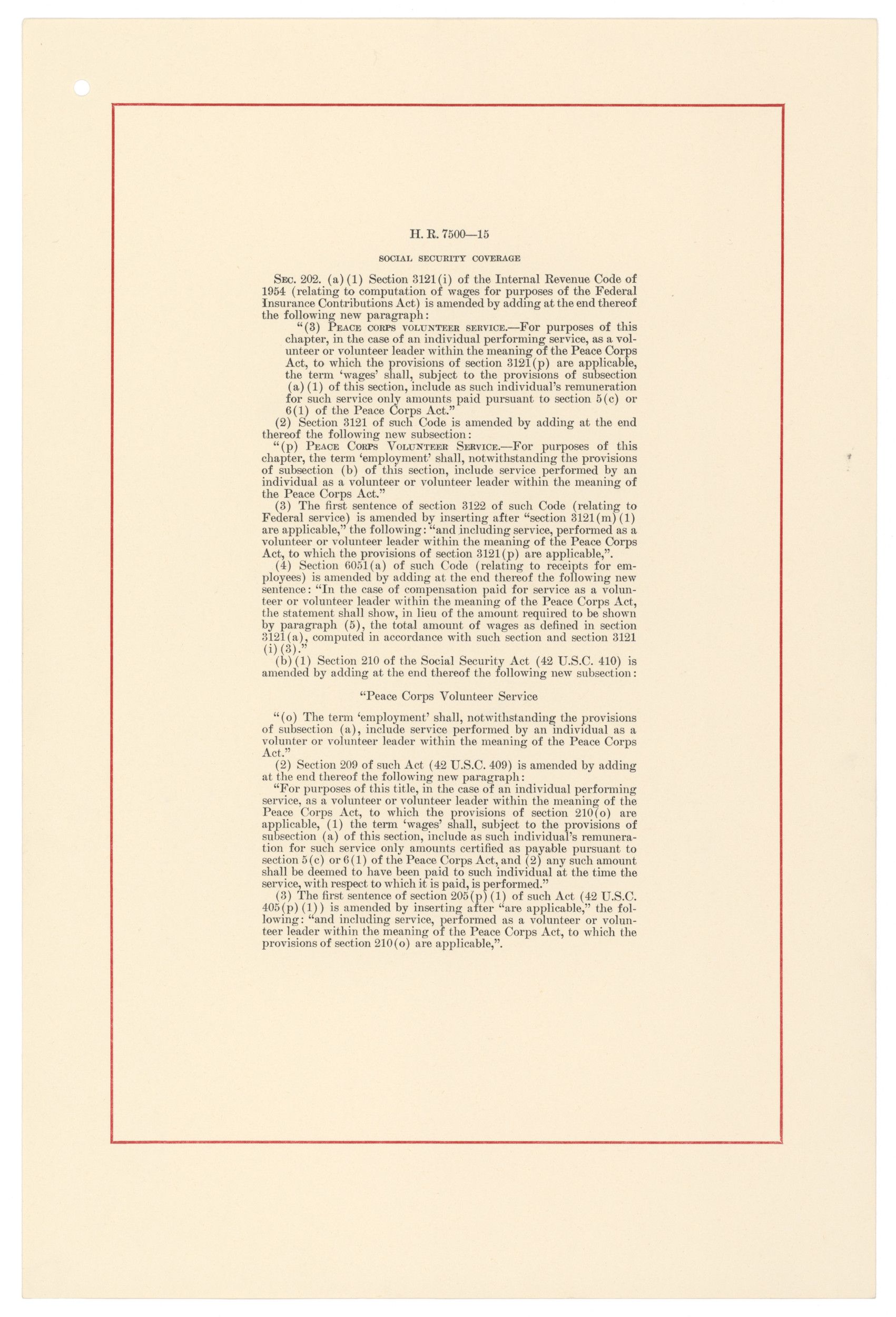
Act of September 22, 1961 (Peace Corps Act), Public Law 87-293, 75 STAT 612, which established a Peace Corps to help the people of interested countries and areas in meeting their needs for skilled man
Page 16
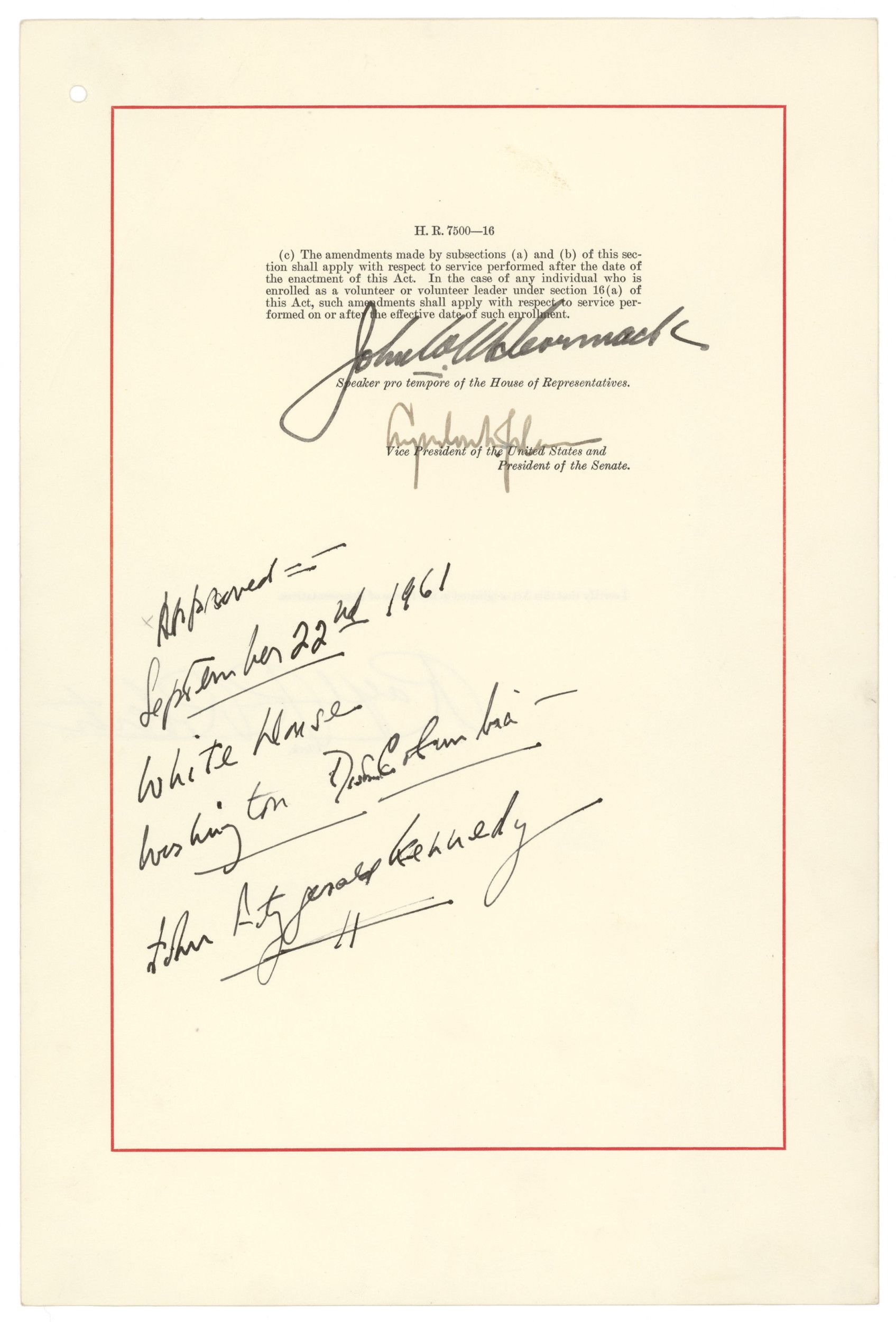
Document
Peace Corps Volunteer Questionnaire
3/1961
This is a questionnaire to evaluate the abilities of prospective Peace Corps volunteers. It comes from a folder of material collected by the office of President John F. Kennedy's secretary, Evelyn Lincoln, concerning the Peace Corps.
This primary source comes from the Collection JFK-POF: Papers of John F. Kennedy: President's Office Files.
National Archives Identifier: 193718
Full Citation: Peace Corps Volunteer Questionnaire; 3/1961; Collection JFK-POF: Papers of John F. Kennedy: President's Office Files, . [Online Version, https://docsteach.org/documents/document/peace-corps-volunteer-questionnaire, April 18, 2024]Peace Corps Volunteer Questionnaire
Page 1
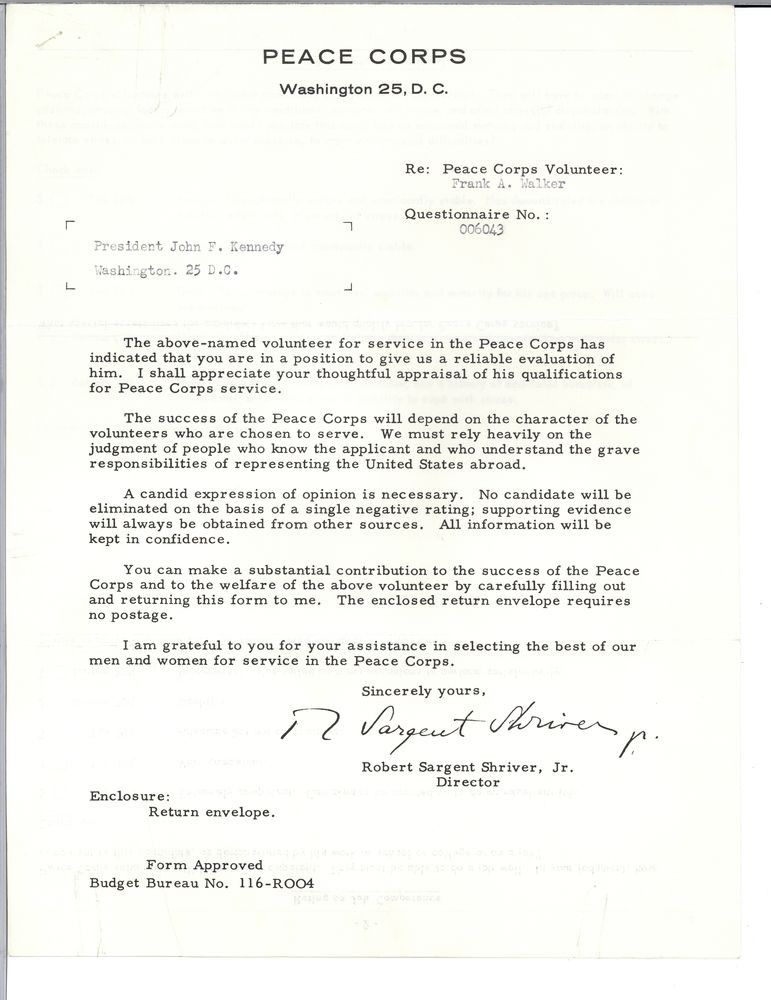
Peace Corps Volunteer Questionnaire
Page 2
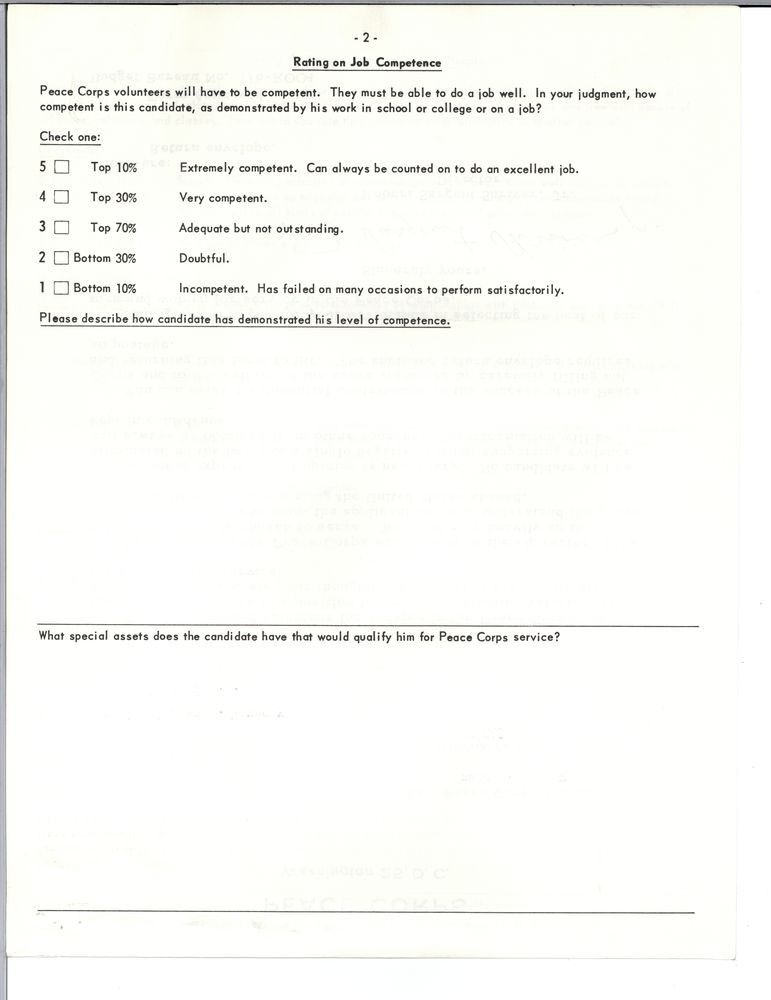
Peace Corps Volunteer Questionnaire
Page 3
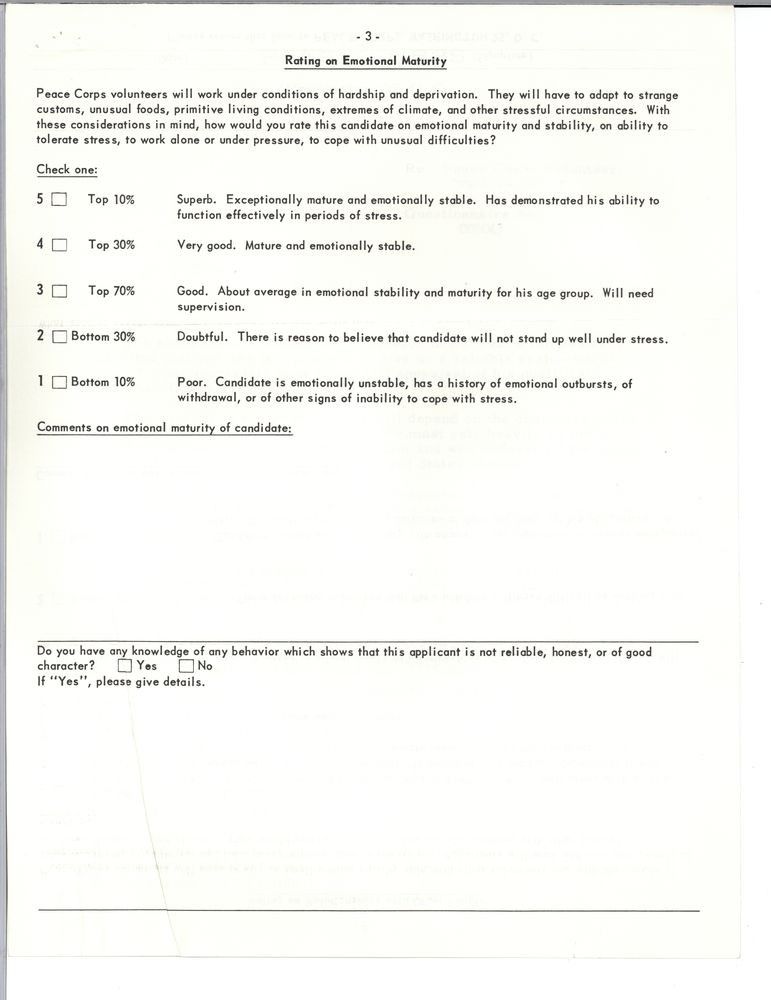
Peace Corps Volunteer Questionnaire
Page 4
